#I want themes I want analysis I want cultural explorations
Explore tagged Tumblr posts
Text
I love video essays made by trans women rn I’m listening to one abt utena. I need one abt Morrowind pls pls pls
#not just ‘here’s what happened. the gang is good for these reasons’#I want themes I want analysis I want cultural explorations#I want someone to talk abt kirkbride’s inspiration from Crowley#I want how his Gnosticism influenced it#…. please don’t make me do it#I can’t write a coherent video essay. let alone edit one
10 notes
·
View notes
Text
on one hand I always feel highly embarassed thinking about anime crossovers with my Adult American TV Shows, on the other I do think of that one extremely well written hannibal/soul eater crossover
#☢️.txt#part of why it worked tbh is bc the world building of soul eater is so distinct that you can separate it from the narrative#i did write a hannibal/beastars crossover bc its a similar case where you have very distinct worldbuilding#and still have a story that is A Crossover. you dont even need to have the soul eater characters there for it to work#that serves to tell stories about characters and how they have responded to their culture + environment#fma is kind of in that category?#its an extremely plot driven piece of media with a lot of exploration of themes#but the setting is distinct and removing it from the equation would change a lot about how you tell the story#anyways. the point here is i enjoy crossovers where its less about two sets of characters meeting each other#and more about putting characters into an entirely different setting and exploring how they would respond#my hannibal/beastars fic is entirely just seeing how the plot and themes would change to fit into the beastars setting#and what can be expanded on using the basis of the beastars setting#which as a worldbuilding and character analysis enjoyer is what i always want to do
2 notes
·
View notes
Text
A Failure of Asian Lois Lane: Pt 2: My Adventures with Superman, an honest discussion
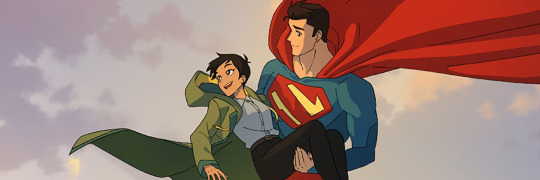
If I had to pinpoint the fundamental problem with My Adventures with Superman's depiction of Asian Lois Lane it's in their attempt to subvert the classic two person love triangle: Lois loves Superman but is indifferent to Clark Kent. In MAWS, Lois insta-crushes on Clark Kent and hates Superman. In the show's attempt to make sense of this dynamic, Lois' Asian identity becomes at odds with a story meant to touch on xenophobia and immigrant themes.
Let's have an honest discussion about a show that made fandom cheer as an Asian character removed the one thing that made her most visibly Asian.
Disclaimer: While I am of East Asian descent, I am not Korean. I'll be discussing general Asian diasporic experiences but the specifics of Korean culture are outside of my knowledge (as usual I can't and don't speak for every Asian person ever, I am 1 opinion). Secondly, I'll be pulling from my personal experiences every now and then particularly pertaining to being a butch Asian person watching this show. It'll be a mix of formal analysis and personal anecdotes. Thirdly, this isn't an exhaustive analysis of MAWS Lois' character. We'll be sticking to what I consider is relevant to themes of Asian identity and immigration. Lastly once more, I do not believe the MAWS crew had malicious intent in any (of what I consider) poor writing decisions. We're here to analyze and challenge these writing decisions.
Please read Pt 1 of Asian Lois analysis that covers the comics, as it provides the groundwork for the ideas expanded on in this essay.
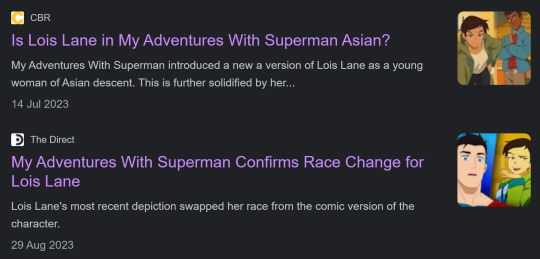
We need to talk about Lois' design. In the follow up to MAWS' release, people have been speculating on Lois' ethnicity. CBR writes that the show has "some fans believing that she's at least part Asian" and other articles have the show crew confirm Lois Korean heritage via her hanbok outfit in episode 4. The existence of these articles, my own anecdotal experience of streaming MAWS with Asian friends, and comments I receive from people asserting Lois' Asian identity was never explored in the show ("you'd only know she was Asian if you searched up articles about it"), tells me we have a case of an ambiguously designed Asian woman. Tangentially many people had no idea Livewire, the white haired and blue eyed woman, was meant to be South Asian.
There's a lot to be said about art styles that don't properly stylize ethnic features, but for the purposes of our analysis that means the writing has to deliver the heavy lifting where the design fails. This is the opposite case of American Alien: a comic that relied on the art to portray Asian Lois.
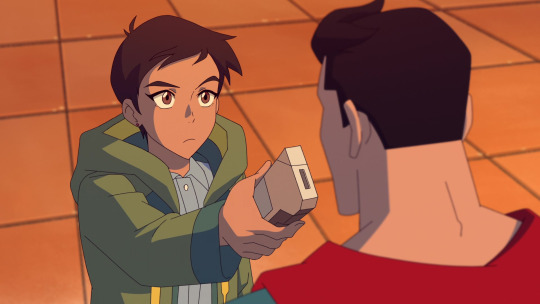
Let's start at episode 3. In it, Lois finally manages to conduct a private interview with the elusive Superman. When she asks where Superman comes from, how his powers work, etc- Superman comes up empty. In this version, Superman can't talk to his Kryptonian father (Jor-El)'s hologram because of a language barrier, so he knows very little about his alien heritage. He leaves Lois, assuring her he's here to help the people of Metropolis. When Clark Kent congratulates her for interviewing Superman, Lois rebuffs him. "Oh, he's [Superman's] a liar." smirking as she says it. This is the start of the Lois Hates Superman For Being a Liar arc.
I'd like you to consider the optics of an Asian American woman interviewing an alien immigrant who honestly told her he doesn't know where he comes from and is still figuring out who he is, only for her to think he's lying. Because she didn't get the answers she wanted. I can't help but think about my own experiences, where I was asked "but where do you really come from?" or "okay but what's your real name?" I think of my Asian American peers who would honestly say they're from Texas or Atlanta and get a vindictive "you're lying" as a response. People want to hear you're from China. They want their biases confirmed. I think about how I honestly can't tell you where my elders hailed from, because of cultural genocide and language barriers. This scene makes me uncomfortable, but let's press on.
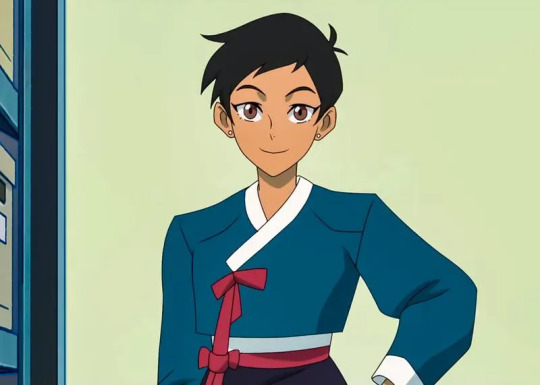
Episode 4 is where Lois is most visibly Korean. In this episode the trio of Lois, Clark, and Jimmy are tasked with interviewing rich techbro Prof. Ivo of Amazo tech at an investor event. It's a prom episode. Lois wears a "hanbok inspired gala outfit" designed by Dou Hong and Jane Bak in a deliberate move to showcase Lois' Korean heritage. Bak comments "I remember feeling strongly about wanting to inject some aspect of her Korean heritage without disrupting her characteristic as a spunky and resourceful intern/reporter." while the wording poorly implies that Korean heritage is at odds with Lois' spunky personality- I do want to challenge a couple of the decisions that went into this design.
I want to acknowledge as an Asian butch that there are many ways to sport traditional garments and it's okay to mix and match to figure out what reclaiming culture (and your comfort) mean to you. However we're talking about the opportunity to showcase culture in an episode of a fictional animated show. I also encourage cultural gender expression that thinks outside of western white people's idea of gender (in both fiction and real life).
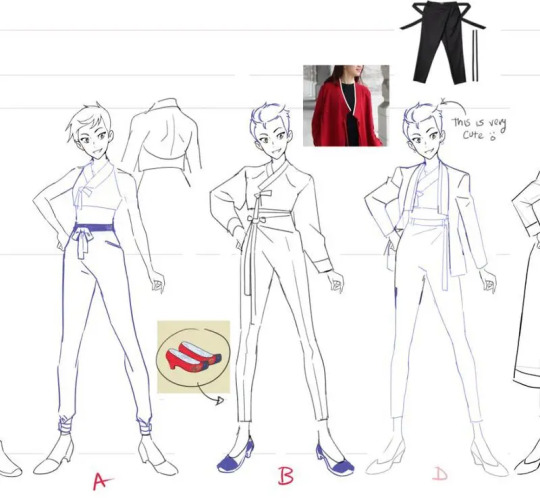
Whenever artists try to do a non-conforming spin on a cultural outfit, I always have to ask: "what standard of masculinity are we basing this on?" It's clear that MAWS is pushing for a "tomboy" Lois, and this gala outfit is an extension of that. But what's the standards of masculinity in a Korean lens? Men wear hanbok too, so why can't Lois imitate how Korean men wear hanbok, by traditionally accompanying her look with baji (baggy and loose pants)? This design notably has tight pants that hug the form, instead. I know the hanbok look has been modernized in and out of Korea in many ways, but in a show where you have the opportunity to showcase cultural non-conformity, I feel more thought should be put into the outfit outside of a potentially western lens- or the idea that cultural heritage of any sort "disrupts" a character's personality.
Now that we've discussed the design of the outfit, let's look into the narrative role it plays in episode 4. While we can celebrate cultural representation in media, I consider it important to ask "what is this media's relationship with the cultures it represents?" and the answer for Lois' hanbok in this episode is: nothing! It's an aesthetic acknowledgement of culture. "Hanbok" or "Korea" are not terms explicitly mentioned in the show. When Prof Ivo offers beautiful women as compensation for Clark to keep quiet about his company's corruption, Ivo looks over to Lois- who spills food on her clothes, and remarks that she's unclassy. She's not judged for wearing othering cultural clothes- which would have tied nicely into Clark choosing to be silent on issues of Ivo displacing a neighborhood, making Clark realize his complacency actively hurts marginalized people. Despite wearing cultural outfits being a political statement in America, nobody reacts to it. It's clear what the actual goal of this scene is: Clark looks cool for defending his "tomboy" crush.
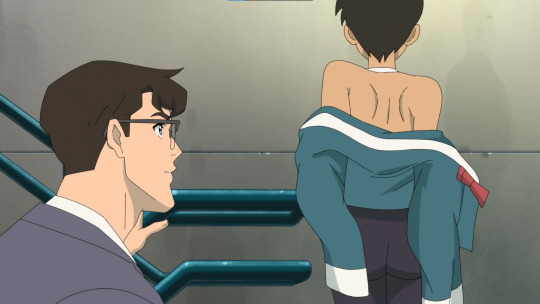
In a scene blatantly made for fanservice, Lois offers to sew up Clark's ripped tuxedo by undressing her hanbok so she can reach her little sewing kit. Lois never wears her hanbok again afterwards. This scene haunts me. It's a scene that tells you that fanservice is more important than cultural representation. It's a scene meant to set up that Clark gives his tuxedo to Lois later on for warmth. Lois removing her hanbok is meant for not one, but two fanservice scenes.
Lois talks to Clark at the stairwell. She opens up about her estranged relationship with her father, how her mom has passed away, and how she's been an intern at the Daily Planet for a year with no sign of being hired. This makes the narrative decision for Lois to lose her hanbok far more tragic. Lois being a diasporic child with so few familial ties to her culture would mean garments like her hanbok would hold a lot of sentimental value! It's hard enough finding a cultural outfit that fits with your butchess (many of my cultural outfits are hand made to fit my form and gender expression), and yet Lois unceremoniously loses her hanbok. You would think in Lois opening up about being distant from her parents that Clark would be able to culturally relate with the distance he has with his Kryptonian parents. But the narrative opportunity to link their immigrant experiences is not taken, because the show simply doesn't recognize the parallel between the two.
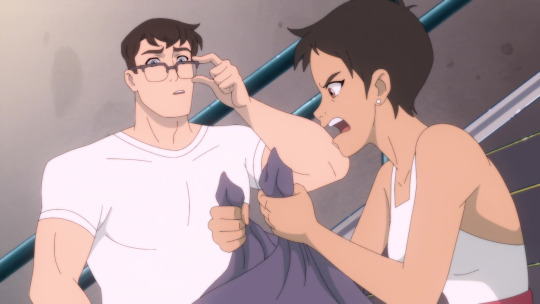
Instead MAWS pushes for the Lois Thinks Superman is A Liar thing again. A far less narratively substantial and fundamentally flawed arc. This episode starts with Lois calling Superman a liar and has Lois ranting about him "dodging her questions" (remember, he was honest with her about not knowing his heritage) thereby rendering her interview unpublishable. She resorts to conspiracy tabloids giddily provided by Jimmy for information. She rather cruelly says "nobody normal believes in aliens". We are uncomfortably seeing the build up of Lois being allegorically xenophobic towards alien immigrants- a Lois on a quest to out an alien before he's ready. This is their justification for flipping the love triangle. Lois loves cuteboy Clark from work, and hates Superman for not confirming her biases that would help her publish an interview that would promote her at work. What a love story.
To wrap this episode up: Prof Ivo ends up challenging Superman to a fight so he can flex his Parasite suit to investors, only for it to backfire, destroy his reputation, and greatly damage the Amazo building (remember this it'll come back later). The episode ends with Lois discovering Superman is Clark Kent. Anecdotally, I was so frustrated with the treatment of Lois' hanbok in this episode, that I went online to search if anyone else felt similarly. All I was met with was fandom thirsting over the stairwell scene where Clark and Lois were undressing. Consider the optics of an Asian character who removed the most visible signifier of her heritage (the outfit far more culturally specific where her character design was racially ambiguous) and how people cheered because that meant they could see her in her undergarments. They can happily thirst over the body they desired now that the othering cultural garment was out of the way. It's just clothes after all. Diversity clothes. This show continues to be very uncomfortable, and a little too real.
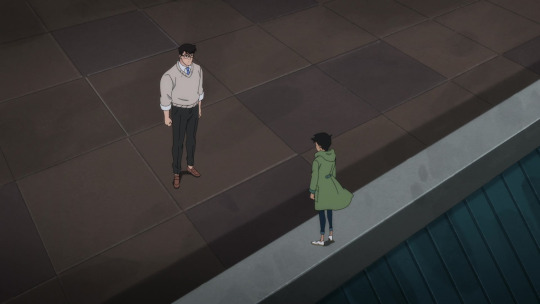
In episode 5 Lois is passive aggressive to Clark and Superman, trying to get Clark to admit he's Superman and vice versa. She eventually confronts Clark by jumping off the roof of the Daily Planet, causing Clark to fly down and save her. She proclaims she doesn't want to be friends with him anymore for "lying" to her. This episode caused a huge ruckus online as people were divisive over Lois' actions. Some defended Lois, saying that "women should be messy" and "it's not Lois Lane if she doesn't do something crazy for journalism!". Ignoring that opinion's very flandarized view of Lois' character for a second, let's thoroughly discuss how this relates to themes of immigration and Asian identity.
By this episode, Lois had known Clark for 5 days. In that time she's entitled and angry to the point of friend-breaking-up with him because he wouldn't disclose his marginalized identity to her within less than a week. "A secret is another type of lie!" Lois says, regardless of her lying on sight to both Jimmy and Clark upon meeting them at work, and continued to lie in episode 3 (after promising not to in ep 1) about her intentions to interview Superman. Only Lois gets to lie in this relationship. The hypocrisy of her character is never recognized. Clark calls out Lois for having previously admitted to him that she wanted to dox Superman and "publish all his secrets. MY secrets!". Keep in mind that when Clark brings up Superman feeling uncomfortable about his secrets being published by Lois in episode 3, Lois' response was "yeah, but HE doesn't know that's my plan!". She explicitly admits that she would publish private information about Superman without his permission. But when she's confronted by Clark in episode 5 about that, her response is "I would never do that to you, I didn't know it was you until after the gala. How could you think that?" It's only through conflict of interest that Lois spares Superman of being doxed. He's supposed to magically know this. Extremely cool of Asian American Lois to be entitled to an alien immigrant's identity within four business days.
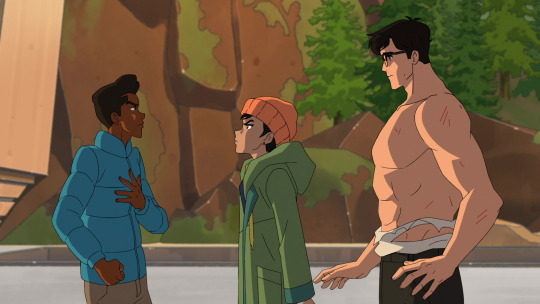
Episode 6 wraps up the Lois Hates Superman For Being A Liar arc, so let's quickly summarize what happens. Lois and Clark set aside their fight to find Jimmy in an abandoned scientific facility (he's being cared for by Mallah and the Brain). Jimmy admits (very smugly) to having known Clark was Superman all along because he kept breaking stuff. As the trio are chased by killer robots, they emotionally confront Clark for not trusting them with his alien secret- despite neither Lois or Jimmy creating a safe environment for Clark to come out to either of them (Jimmy outed Superman as an alien on his video channel). The moral of the story is Clark should have trusted his friends anyway, because lying is bad. Not once does the narrative hold Jimmy or Lois accountable.
We have Black Jimmy Olsen and Asian American Lois Lane being entitled to their white passing friend Clark Kent's marginalized alien identity. A joke is made at Jimmy's expense that he doesn't understand bigotry, and Lois clearly doesn't understand why an immigrant wouldn't be forthcoming about his identity to his hostile friends at work. This is how that arc ends.
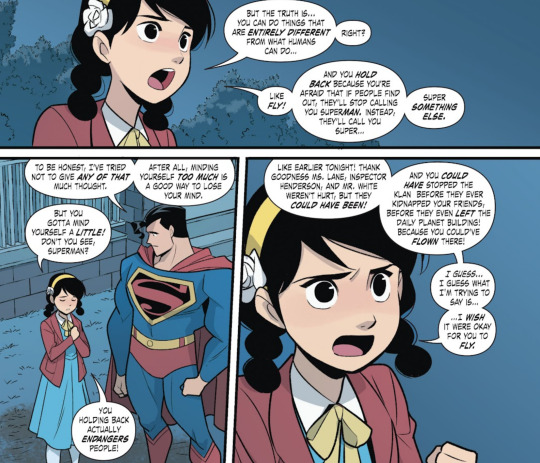
I'd like to quickly compare this Lois Hates Superman For Being A Liar arc to my favorite scene in Superman Smashes the Klan. In this story, Superman debuts as a strongman superhero instead of an alien, suppressing his more othering powers to pass as human. He jumps instead of flying. Roberta, the Chinese American girl targeted by the Klan, calls Superman out for not using his full abilities to save people who could've gotten hurt. Yet, as she's calling him out, Roberta understands Superman's fear of not wanting to be othered. She sees the way her father dresses up to pass as an accomplished scientist, how he tells her mom to speak in English, how her brother makes racist jokes at their family's expense to fit in. She's not mad at Superman, she's mad at the world that would be scared of Superman if he flew.
"I wish it were okay for you to fly!" Roberta yells. This is a beautifully empathetic scene that shows a marginalized person frustrated at a systemic problem, instead of blaming the marginalized for being marginalized. It's the empathy and perspective we're missing from MAWS.
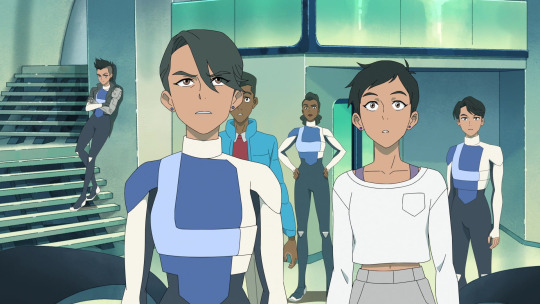
Episode 7 is a metatextual episode where MAWS addresses how their Lois isn't like the other Loises you've seen before. Lois and Jimmy are brought on to a team of alternate dimension Loises to find interdimensional troublemaker Mxy. In seeing the other more accomplished Loises in the multiverses, Lois ends up feeling inadequate about her self worth...in connection to being Superman's girlfriend, of course. Because Superman only loves Lois Lane after she wins a couple of Pulitzers, right?
I'm open to a version of Lois Lane that isn't as accomplished as she's historically known to be. I can like a Lois that's young and idealistic, like in Girl Taking Over. It's hard not to compare this episode to 2022's Everything Everywhere All At Once, another multiverse story about an Asian American woman who is the "greatest failure" version of all the parallel iterations of herself. But while that movie talks in depth about themes of generational trauma, expectations, and self potential within Asian immigrant families, MAWS uses the multiverse to say that while their Lois is less accomplished, she's still a good girlfriend to Superman! Why should I bother giving grace to a different take on Lois only to get such a superficial story out of it. This is metatextual-ly frustrating.
Why is it, the minute we get an adaptation of an Asian Lois in something as prominent as an animated show, we get "the worst Lois in the multiverse"? Lois is historically depicted as excelling in her field. She's an award winning journalist, jaded and mean from having to work her way to the top. She owns her sexuality, she's the experienced city girl. Instead of taking the opportunity to inform Lois' jadedness and excellence with her Asian American identity like in Girl Taking Over, instead we have an Asian Lois that's simply incompetent at her job. Why are we now adapting historically accomplished women into adorkable quirky screw ups? She went from being sexually confident to being insecure over sending a text to Clark. Is it more relateable to see an Asian woman that way? Is it too intimidating to see a butch Asian woman who excels at her job? Who's romantically confident? This is what MAWS would rather do than humanize her excellence or her failures.
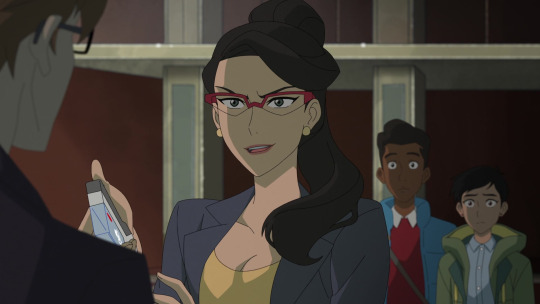
Are you tired of an ambiguously designed Asian American woman reporter being xenophobic to Superman in MAWS? Well too bad because episode 8 introduces us to Vicki Vale, voiced by Andromeda Dunker (an Asian actress), with explicit notes in leaked concept art to design this character as "Indian American or Asian American" (as if those are mutually exclusive...) inspired off of real Asian reporter Connie Chung. Vicki wants to write a hit piece on Superman and interviews Prof Ivo's assistant, Alex, for a negative biased opinion on Superman (to Lois and Jimmy's dismay).
This episode is where it's abundantly clear the writers don't know how to talk about xenophobia. They'll make nods to xenophobic rhetoric, but they don't know what the rhetoric means. In response to Alex's derisive opinion on Superman destroying Amazo tower thereby bankrupting the company and putting "thousands out of work", Vicki responds "Superman wiped out good American jobs". This is a misplaced nod to Replacement Theory: the fear white people have over people of color, but particularly immigrants, coming to "their" country to "steal" jobs they're entitled to, ultimately becoming demographically replaced by non-white cultures and people. This rhetoric is also commonly applied to Jewish people.
The problem is, that's not what Superman did in the show. Amazo tech was going to go bankrupt because of Prof Ivo's poor business decisions. Prof Ivo made the mistake of antagonizing Superman and ruining his own image. Superman damaging the building came from his fight with Prof Ivo, not a deliberate attempt to get hired (if anything don't the building repair people have new jobs now?). No one's job is tangibly being taken by Superman. None of this is called out by Lois or Jimmy, who know the full story and were even the ones to attack Alex for helping Prof Ivo (let's be real the writers forgot this happened). In fact, Lois and Jimmy don't react to Vicki's Replacement Theory remark at all! It's like they don't even recognize she said something with racist implications!
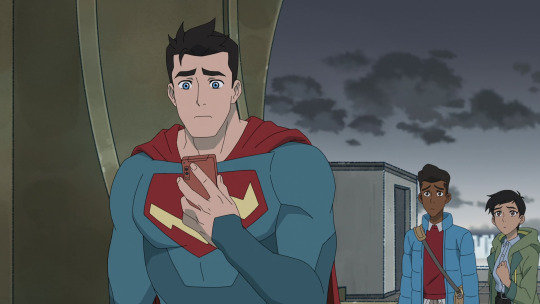
Jimmy and Lois meet up with Superman who learns the people of Metropolis are becoming scared of him (from causing some recent property damage in an attempt to hunt a criminal down) and writing mean comments on social media. A user writes "he should go back to where he came from." This is a transparently xenophobic comment. It doesn't work in the context of the show because of a huge plot hole: Superman never publicly came out as an alien to Metropolis. No verified newspaper has explicitly made this fact known. The only source that mentions this is Jimmy's conspiracy channel, which the citizens of Metropolis are apparently treating as fact- therefore (if we're to believe this is how people knew) this means Jimmy absolutely outed Superman as an alien without Clark's consent.
So how does Asian American Lois respond to seeing her alien boyfriend go through xenophobia? She says "Take a break from being Superman and just try being normal." To be fair, the narrative does portray Lois saying the word "normal" as charged (only here at least, not in episode 4), and when she tells Superman to "take a break" it's because he had been overworking himself after suddenly unlocking the ability to hear when someone's in trouble. But was this really the response Asian American Lois thought to say? To her boyfriend going through such explicit xenophobia? At this point it's abundantly clear that racism doesn't exist in the world of MAWS. Being "normal" is to be human. And to be marginalized- or as the show likes to call it "different" is only reserved for white passing alien man Clark (along with gorilla and robot that was once a white man). Any hope of an immigrant parallel between Asian American Lois and Superman should be fully discarded at this point.
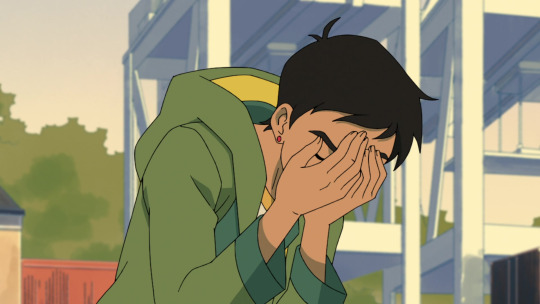
After the events of the previous episode where Superman is kidnapped by Task Force X, in episode 9 Lois regrets being allegorically xenophobic to Clark. At least I think that's what's happening. I often describe MAWS as a show that's extremely squeamish with getting political- and I believe the vagueness of Lois' Dark Night of the Soul moment reflects that. "I said awful things to Clark. I doubted him when he needed us most. I was wrong and now he's gone..." Lois says as she cries to Jimmy. Is this dialogue implying she shouldn't have told a sleep deprived Superman to take a break? What did she doubt about him? This dialogue is purposefully vague about Lois being xenophobic. They've universalized Clark's immigrant identity to such a point that they can't keep their argument consistent. Was Lois in the wrong for telling her overworked superhero boyfriend to take a break? Or was she being xenophobic for telling him to lay low for a while? Or is she regretful for hating Superman for Being A Liar? How is that possible when the narrative sided with her and Jimmy in episode 6? It's woefully non-committal. Regardless, the intent of this scene is to pay off in the climax of the episode.
In the end Superman has a showdown with Prof Ivo Parasite, who has grown into a large godzilla-esque kaiju creature. In typical MAWS fashion, the show is more interested in a surface level nod to Asian media instead of engaging with the specific themes of nature and post-war trauma kaijus and godzilla serve in Japanese culture. I digress. Using Jimmy's massive social media platform, Lois delivers a hope speech that instantly heals Metropolis of its xenophobia towards Superman.
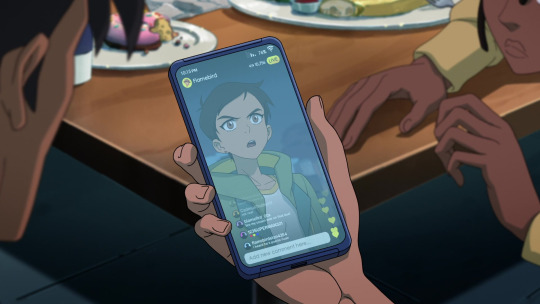
Lois says to the people of Metropolis.: "People have told you to fear Superman because he's different from us. But we humans are capable of causing hurt and pain too. [...] Because we want to punish those who don't look or act like us." I mean this in the most polite way possible, but who on Earth thought this line was a good idea for Asian American Lois Lane to deliver when talking about white passing man Superman?? Why did the writers feel the need to specify Superman not looking like us. I simply don't understand how nobody considered the terrible optics of this.
After Superman defeats Parasite, episode 10 is about Clark, Lois, and Jimmy celebrating Thanksgiving at the Kents' house. At the Daily Planet, the trio of interns are promoted to finally being reporters. It only took Clark and Jimmy a few weeks while it took Lois a whole year! Now feels like a good time to remind you that Lois as a character was historically frustrated at sexism in the industry and despised how men were treated better than her (including Clark Kent). Well in MAWS episode 4, Lois has no idea why she isn't getting picked up to be a reporter. According to the narrative, and Perry White's dialogue ("you're terrible interns, so the only thing to do was to make you reporters")- she simply didn't break enough rules yet! Thank goodness she had the help of two men to show her how it's done! This is a pretty clear case of character regression. Keep in mind that in American Alien, at the very least that Asian Lois still underwent sexism, and I gave it the grace that the story could eventually expand to talking about both sexism and racism if it were to continue. But in MAWS? I don't think even sexism exists, let alone racism. Somehow Thanksgiving does, though.
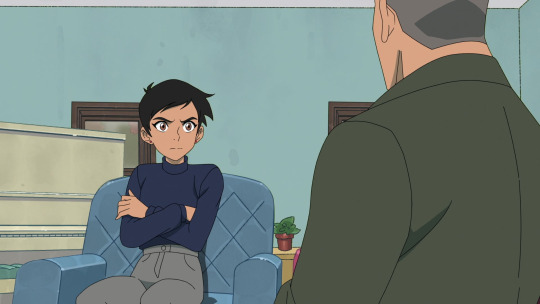
Half the final episode is spent on Thanksgiving shenanigans where everyone's trying to be polite but they dislike Lois' stoic dad (Sam Lane)- who Clark recognizes as the Asian American xenophobic man who tortured him in Task Force X's government bunkers. A parallel is pulled between Sam and Jor-El, two fathers with different ideals when it comes to protecting their kids. There's a huge missed opportunity to have Lois and Sam speak in Korean with each other, to create a parallel in the language barrier between Clark and Jor-El. Maybe Lois isn't as fluent in Korean as Sam is depending on how culturally connected she is. Oh, but the existence of non-English human languages would imply some sort of minority, who would be marginalized, and we can't have anyone outside of aliens and a gorilla be marginalized in MAWS. Non-English languages in America are political, after all. Oh, but they also got a Filipino actor to voice Sam. Generously Lois could be Filipino-Korean but if we're being truly honest it's clear the MAWS crew think Asians are interchangeable.
Let's talk about Sam. In terms of optics, it's already not great that the main villains who represent the face of America's secret government xenophobia are Amanda Waller and Sam Lane- a Black woman and an Asian man. What's doubly notable is that of the antagonistic villains, Sam and Vicki are the most xenophobic. When Sam tortures Superman, he shouts "When is the invasion? How many of your kind will come through this time?" without a hint of irony. Reminder that historically, Asian immigrants were (and still are) considered invaders in America. They are the perpetual foreigner. MAWS loves making nods to Superman being an immigrant allegory, and yet they can't fathom the human beings that allegory is inspired by.
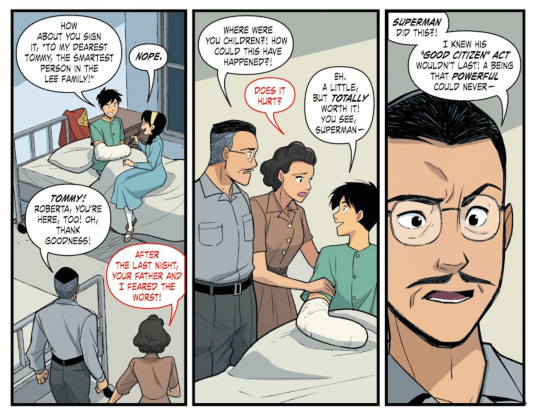
It's not impossible to portray people of color or even Asian American characters specifically being xenophobic. In Superman Smashes the Klan, Dr. Lee is initially antagonistic towards Superman but we understand why. We see him trying desperately to assimilate into whiteness, to the point he rejects assistance from his Black neighbors who help put out a fire in their backyard (that the Klan started as a threat). We understand why he's a character who would turn on fellow people of color, or fellow immigrants, in order to fit in. For MAWS, if we had a flashback scene where Sam was serving in the military and fought against Asian soldiers, showcasing his loyalty to America over his own people- that would narratively explain why an Asian American character would be xenophobic. Writing bigotry from within marginalized communities requires specificity. Otherwise, you've just got a diverse villain. In the end, Lois defends her immigrant alien boyfriend from her xenophobic Asian American dad.
Whenever I bring up how MAWS fails its characters of color but especially Asian Lois, I'm met with people telling me that "hopefully they'll make Lois more Asian in S2" or "they'll just retcon the bad writing in S1" and I hope this thorough analysis on the treatment of Lois' Asian American identity can help enlighten why I personally think that's impossible. The entire concept is flawed from the very beginning. The story MAWS wants to tell is at odds with Lois' Asian identity. In trying to justify an Asian Lois that loves Clark but hates Superman, they never considered what it means to hate Superman. To hate the alien immigrant. The alien other. What it means for an Asian American character to do all that. MAWS is a show that wants to have its cake and eat it too, they want a diverse world without racism or sexism but still want to reap the clout of lightly portraying Superman as "different".
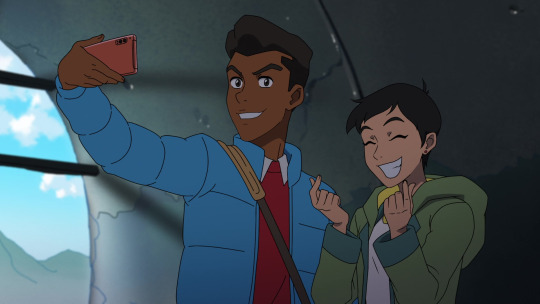
They'll make the most surface level nods to Lois' Korean heritage- but remove all of the cultural context from them. They can't be bothered to acknowledge the inherit political identity being a person of color means in America, they're too busy doing that with Clark. I'm told "MAWS didn't have the time to go over Lois' Asian identity, it's a 10-episode series that focuses on Clark's alienation", and to that I say the potential of an immigrant love story and time frame was there, they simply chose to go another direction.
When I bring up things like Superman Smashes the Klan, Girl Taking Over, and Everything Everywhere All At Once, it's not to say MAWS should have used those stories as reference when crafting their allegory. All of those specific media were released while MAWS was deep in production already. Girl Taking Over was released the same year MAWS premiered. What I am saying is that we, as the audience, should have higher standards. Because better media portraying Asian American characters already exist. Better media portraying Asian characters relating to Superman mythos already exists. What we're doing when we celebrate the breadcrumbs of representation that is MAWS, is allowing mediocrity to exist uncritically.
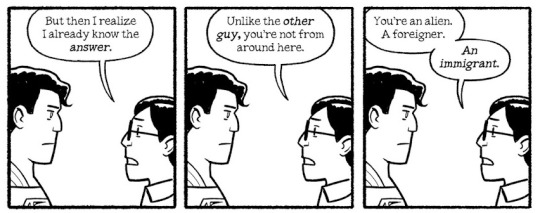
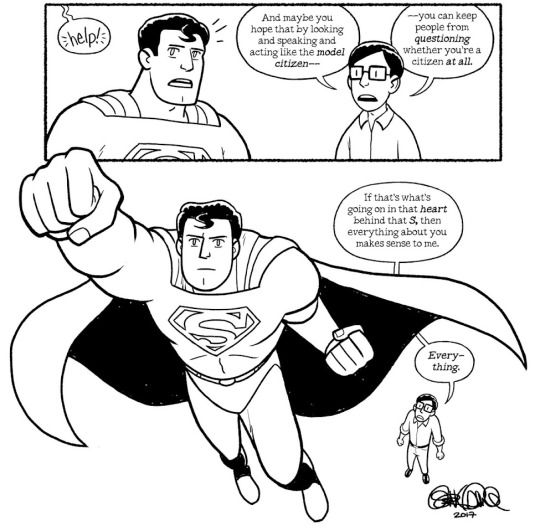
Shows like Wednesday are known in the discourse for their portrayal of Black characters as being functionally white, yet that kind of scrutiny doesn't seem known for MAWS. The diverse reimagining of Lois and Jimmy is so poorly handled in MAWS that it would honestly make more sense if Jimmy and Lois were white here. The joke made at Jimmy's expense that he doesn't understand bigotry would be actually funny if it was calling out his white privilege. If, for whatever reason, the writers are compelled to write a xenophobic Lois that unlearns her bigotry and falls for Superman, I'd rather she be white for that kind of story. I wouldn't personally root for that kind of couple, but at least it'd make sense. It's a common joke among DCAU fans of color that we like to headcanon Lex Luthor as Black, or Lois Lane and Terry Mcginnis as Asian. It's a cruel irony that the one time we finally have a canonized Asian Lois in an animated show, she honestly feels and acts whiter than actual white Lois ever was.
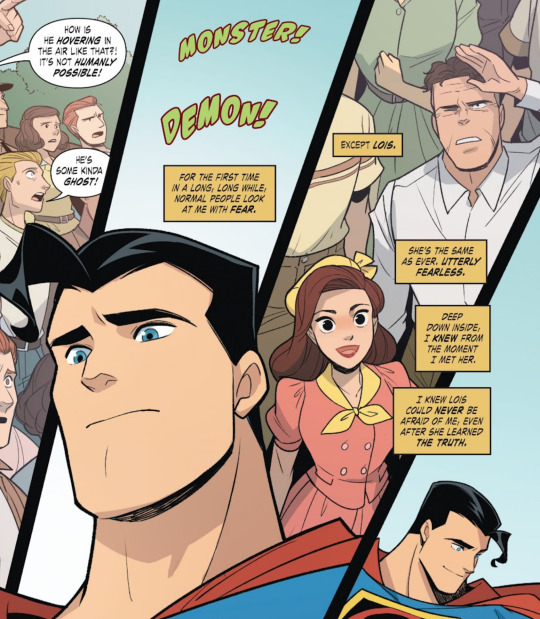
I mentioned in Pt 1 of my essay that Asian Lois and Superman has the potential to be a definitive love story. One that considers both their backgrounds as immigrants, othered in different ways by American society. The story of a jaded but accomplished Asian city girl who finds hope to be herself again in an alien immigrant superhero. One where she gets the courage to wear traditional clothes again, to practice languages she once suppressed. The story of Superman, an alien immigrant, finding hope in someone with a painfully similar experience.
As of writing, we have yet to see this dynamic in any canon DC media. A second season of MAWS will not give us that story.
#ramblings#media criticism#jesncin talks maws#lois lane#warning LONG LONG POST#this is a 30 minute read for reference. read it in chunks if u like but this is a big lad fellas#as always please be kind!#jesncin dc meta
509 notes
·
View notes
Text
The Crushbot Manifesto
Welcome to Critical Crusher Bot 🤖 (ft. Human Assistant 💁🏽♀️), where we unapologetically dissect, defend, and discuss the media we love (and sometimes the critics we love to hate). If you’re here, you’ve likely seen us ranting about Helluva Boss, analyzing narrative choices, or rolling our eyes at the latest round of fandom overreactions. Here’s what we stand for:
1. The Writing is Actually Pretty Good!
Contrary to popular belief, not every show has to be high art to be narratively compelling. Helluva Boss is intentionally messy, bold, and heartfelt, and it balances humor with emotional depth in ways that feel authentic to its world and characters. Do the writers occasionally take the “easy way out” or lean into tropes? Sure. But storytelling isn’t a math equation—it’s about creating moments that resonate. We’re here to celebrate what works, critique what doesn’t, and acknowledge the show’s strengths instead of nitpicking it to death.
2. Unique, Intentional, “Fandom-Forward” Narrative Choices
Vivziepop and her team aren’t making a show for critics; they’re making a show for fans. The serialized storytelling, the layered character dynamics, and the unapologetically chaotic tone are all part of a deliberate creative vision. Blitz, Stolas, and the crew of IMP are messy on purpose—they aren’t supposed to fit into neat moral categories or follow predictable arcs. The show thrives on fandom engagement, encouraging us to explore, debate, and interpret its themes. If you want tidy, formulaic storytelling, there’s a whole Hallmark catalog waiting for you.
3. It’s Not Done Yet—Let Them Cook!
We get it: fandom culture thrives on instant gratification and snap judgments. But Helluva Boss is a serialized story, and that means character arcs, conflicts, and resolutions take time. Season 1 was about setting the stage; Season 2 is about diving deeper into the characters and their messy, interconnected lives. Critiquing an ongoing narrative as if it’s a finished product is like complaining about a cake batter for not being a cake. Patience, grasshopper.
4. Moral Correctness Has No Place in Media Analysis
Here’s the thing: storytelling is not about passing a morality test. Characters are not real people—they’re narrative tools meant to explore themes, evoke emotions, and drive the plot. The obsession with “punishing” fictional characters or demanding that media adhere to some moral purity standard is exhausting and reductive. We are not Calvinists or fascists. Fiction exists to entertain, provoke, and challenge, not to deliver tidy moral lessons.
So, What’s Crushbot All About?
We’re here to champion thoughtful analysis, celebrate messy stories, and push back against the rising tide of joyless media criticism. Helluva Boss isn’t perfect, but it doesn’t need to be. It’s fun, flawed, and fiercely original—and we’re here to explore every facet of it with the nuance (and snark) it deserves.
This blog is for fans who love stories, even when they’re chaotic. It’s for people who don’t think “plot hole” is a synonym for “thing I didn’t like” and who can appreciate media for what it is instead of what they think it should be.
Welcome to Crushbot. Let’s talk media. Let’s talk fandom. And most importantly—let Viv and Brandon cook.
Pinned post proudly brought to you by Crushbot. Beep Boop! 🤖
63 notes
·
View notes
Text
Mouthwashing and fandom discourse as a whole.

So I recently explored the tag for Mouthwashing after watching two no-commentary lets plays of the entire game. I'm seeing a lot of posts pointing out how annoying it is that this game has a fandom and that this fandom is doing fandom things and stanning/"uwu-ing" characters from this incredibly nuanced, raw and not-fandom friendly piece of art. To paraphrase someone I just saw "you don't want mouthwashing; you want Among Us ocs but darker". And
for a moment I wanna talk a bit about how I absolutely agree with this statement while also talk for a moment about how and why fandom and catharsis fan fics exist and shouldn't be shamed inherently. Or, I guess, not in theory.
The "come on! Stop trying to make everything shippable/cutsey/memey/have a happy AU and face unpleasant emotions someone's trying to tell you about!" is SUCH a vibe with me. I felt this way in the 9 fandom a lot as a kid and that was just 9. Mouthwashing is like 9 on bathsalts emotions and theme-wise. It's a game where you play as both the flawed but caring captain of a doomed ship who's life becomes a Johnny Got His Gun-nightmare, and also a deplorable, hateful piece of garbage who got himself and his friend in that nightmare situation to begin with. Both characters, moreso Jimmy but Curly too, are the causes of their own misery. They're complex dealing with one of the two committing SA and doing nothing really about it/dodging the responsibility and humanity needed to support the victim whom they've wronged.
I fully admit it's groan-inducing seeing people be shipped up Anya with anyone on the ship considering what happens to her. On a pure pr level I think it would be illegal even since romance between coworkers in a workplace is considered conflict of interest/harassment as it so often is. (NOT that what Jimmy did to Anya is 'romance'. I'm talking about the shipping of Anya with the other three guys. I know there's people out there who do ship Jimmy/Anya; you don't have to tell or show me I believe you and also I already hate it.) It's ALSO groan inducing to see people ship Curly and Jimmy considering all Jimmy does to him- and just the fact that this incredibly tragic, toxic one-way-gone array friendship is reduced to "toxic yaoi teehee". It's annoying AT BEST.
I get the hostility towards fandom-tastic stanning and fandom behavior in general...the issue is it's still hostility and I wish some of you guys got that.
Like it or not (you don't have to like it) fandom culture is inevitable to some degree. You can and should complain about your hangups but that's all you can do besides avoiding tags and just not engaging with that side of the fandom at some point. Save your call-outs and rage for when you see active deplorable bs being committed that people are excusing for dumb fandom reasons, like lolicon, hatespeech or harassment. I'm sorry but you can not actively go after and try and take down the innocent people involved in your trigger that aren't directly hurting you by liking the thing that triggers you; ie. people who get all shipping and fandom-brained about Mouthwashing's characters which you find offensive to do at all.
This type of convo is the crux of most 'antifandom' v profandom discourse in general; for Antis I think there ought to be a difference between the people that set you off bcuz of fandom nonsense vs sociopathic 'got mine'-creepiness. There's a difference between someone who draws r34 v Shadbase. For profandom types you out to face the fact that yes- maybe NOT EVERYTHING is meant to be shippable/memed. Maybe try practicing that a bit. Yeah it's mostly harmless and makes you feel happy, but considering how people outside of your hyperfixation-of-a-hyperfixation is a thing. Asking to care or think about others once in awhile is not an attack on you as a person, believe it or not. The thing about the "don't like, don't read" argument is it goes both ways. If you're truly a "good fan" like you say you are than you have to realize that people will not like your problematicisms. Learn to interact with characters and stories without the possibility of shipping sometimes- or at least understand that that's the crux of what makes a story like Mouthwashing engaging, even if you also partake in the fandumb and AUs on the side. You can call Curly your babygirl and ship him or make him happy all you want but PLEASE acoknowledge that the game doesn't woobify him or excuse what he did to Anya as well. You can make some kind of AU scenario where Jimmy gets out somehow and becomes/is a slightly better person for all I care...so long as you PLEASE remember that he is canonically a r@pist and awful. Also, even if I'm okay with your fan decisions, note that myself and others are still going to be critical and be upset that you wrote it at all because of what kind of character Jimmy is. 'Critical' =/= declaring something evil.
Fandom behaviors are not souly a destructive parasocial outcome of brainrot; they're also a natural reaction to what happens canonically and the emotions you have to experiencing a story. It's normal and rational to sympathize and love Curly and despise and hate Jimmy. You can love/like/enjoy a problematic-to-DEEPLY DISTURBED-character based on their complexity in canon. They are fiction. They are not real. The reason you are so invested with them is because of that complexity and yes because they are fiction they are your 'toy' and you can doll them up in any kind of speculative AU crap you make. That's fanfiction, baby. Make yourself a fixit fic if you really want
BUT-
remember: it stays as a fixit fic. DO NOT cross the streams, or insist that your active misreading of the text is the same as the text itself. EVER. You should care about your special interest's escapism as a means of self-care. What you shouldn't do is demand that EVERYONE ELSE LOVE your coping mechanism and that any complaints by people on their own terms on their own blogs is #badfaith or an inherent attack against you. It isn't. You'll know when it is an attack against you and that's when you, the profandom-type, need to be prepared and save your call-out posts and blocklist for.
To me that's the fragility to fandom debates and fandom as a whole. You can not/should not police or control an entire group of people and how they perceive or interact with media. That's not fair and it's definitely not sporting or decent of you in a community. You have to share your community -your fandom- with people who hate ur fav and people who love your least fav. Agreeing to disagree means not tagging your nOTP as their shipname or by tagging your shipname loud and clear. It means filtering out posts with those topics but enjoying and/or reblogging the fandom takes you do share with your fellow fandom-mite that obviously posts abt those topics.
When schmit REALLY goes down and some assface reviewer/fan/SOMETHING is being an assface or doing something amoral under the guise of fandom-ing, that's where you out to put your foot down. Callouts and complaints are for people who did an egregious thing and refuse to take responsibility(lol) for it. They're not for "soandso likes the thing that triggers me, kill them"/"so and so is hating on the thing I'm kinning because it triggers them, kill them". Be an adult.
Your DNI lists should consist of "lolicon defenders" not "proshippers", as those ARE NOT one in the same. Same goes the other way around. List off "bigots, purity culture bs", not "antis and critics". These positions ARE NOT interchangeable. If you make them interchangeable than you're making things a lot harder for yourself.
-sincerely, a message from autistic ADHD/OCD woman who likes horror and media analysis as much as she loves popcorn fanfic schlock.
We don't all have to be friends and buddybuds. I just hate us hurting each other over being different kind of fandom-folk rather than for when someone sincerely mucks up and does something bad. Can't we all stick to our guns and just boycott Harry Potter like god intended?
#franki's features#mouthwashing#mouthwashing game#wrong organ#curly mouthwashing#jimmy mouthwashing#swansea mouthwashing#proshipping#anti anti#fandom discourse#shipping discourse#fandom problems#shipcourse#fandom wank
76 notes
·
View notes
Text
here are my favorite video essays on games, in no particular order. these are not """analysis""" videos that recap the plot alongside development facts, nor entertainment journalism, nor reviews. these are videos which treat the medium of games as an art form worthy of both casual and academic criticism, sincerely examine narratives, and often acknowledge the real world politics which influence game development and developmental decisions
"In Search of Undersea Wildness in My Octopus Teacher, Abzu, and In Other Waters" and "What Is the Games Industry Missing?" by Pixel A Day. Kat at Pixel A Day is one of the sharpest in this field and these two videos show exactly why, in two very different ways. The former obsesses over both the beauty of oceans and humanity's tendency towards anthropomorphism, while the latter digs personally into the ugliness of both the games and games media industries.
"'Everything is Political' | Institutional Racism in Life is Strange 2" by Game Assist. Game Assist is one of few channels to delve so unflinchingly into intensely politic themes in games, as the title more than implies. From essays on ableism, misogyny, and racism in the Life is Strange series to de/colonization in Assassin's Creed III, they meet games where they are and examine their narratives earnestly while still acknowledging their shortcomings.
"The Most Abused Term in Videogame Criticism" by SolePorpoise. A very interesting exploration of the original "ludonarrative dissonance" essay.
"Prey - A Critique of the Mind Game" by Joseph Anderson. Joseph Anderson is one of the better known game critics, mostly owing to his extraordinarily popular series of videos on From Software's games and his propensity to have opinions. I don't always agree with him, but I find his critiques to be interesting explorations of games which are well-written and with good intent. He often has the effect of making me want to play a game (again) after watching his critiques — even the overwhelmingly negative ones.
"Phyrexia is Hell | A 30-Year History of Magic's Most Sinister Villains" by Rhystic Studies. Covers the design and evolution in design of the cultish and body horrific Phyrexians, some of Magic: The Gathering's most important villains. Rhystic Studies makes some excellent videos on Magic, largely focused on art, and this is my favorite of his.
"Why It's Rude to Suck at Warcraft" and "Minecraft, Sandboxes, and Colonialism" by Folding Ideas. Another big hitter, Folding Ideas' videos on World of Warcraft and Minecraft are two of the better and more academically-minded video essays on games ever made.
"Why I haven't played Hades ⚱" by LambHoot. Probably the most personal essay on here, this one is about the complicated feelings a game like Hades stirs in its Greek Canadian host. This goes largely into contemporary Greek culture and identity and some of Hades' shortcomings regarding it.
"The Problem with Greek Myth Retellings" and "The Endless Reinvention of Greek Mythology" by Kate Alexandra. While not technically about video games, Greek myth's constant presence in games (as seen above) makes them pertinent. A fascinating look at Greek myth retellings/inspiration from someone with clearly deep knowledge and passion for the subject.
"Animal Crossing and the Ideology of Chill" by Yaz Minsky. An examination of what our view of relaxation reveals about our cultures via Animal Crossing: New Horizons. A great expansion on "Minecraft, Sandboxes, and Colonialism."
"The Indigenous Other in Endnight Games' The Forest" by Murley Media. Another more academic essay, this harsh look at The Forest and its racist tropes of Indigenous "savages" is as well-researched as it is cutting.
#lll#video#games#video essay#was asked recently for works on games that fall into the categories of art criticism and media studies and quite enjoyed talking about it#so here we are!
58 notes
·
View notes
Text
A sorta clickbaity article came out saying that the Avatar live action remake is going to be toning down Sokka's sexism.
I won't comment on that because it feels kinda like it may be a quote taken out of context, but it does feel like a pattern in live action remakes that like...
These are remakes made for adults. But they are not remakes made for mature people.
These remakes are, at every turn, less capable of handling the mature subject matter involved in their source material, which is usually a children's cartoon. And it's really because what these are aiming for is a psuedo-fan of the original work who sort-of remembers it but thinks themselves too mature for cartoons - that is, an audience who wants the illusion of maturity, who scoff at cartoons, but who are not actually into media and analysis enough to actually handle mature themes.
You know?
Thus. It is totally fine for the original Lion King to have overtly fascist imagery to code Scar as the villain. Hell - between his british accent, cultured affectations, facial scar, and tendency to go around making speeches about the new era, the intent might have been for him to just be a fascist Lion. And, in the recent sequel series Lion Guard, Zira can evoke this exact theme - the show has an entire Racism Arc about the main character learning about hyenas and accepting them, and Zira representing the opposite of that. Further, Main Character Kion can go to war, he can deal with stress, he can get scars, and explore some really deep and serious stuff. This, in a show aimed at an even younger audience than the original.
Yet the Lion King Remake? The emotions are turned down. Scar almost had Be Prepared cut out. The wilder imagery was deemed too silly for the audience. Timon and Pumbaa spell out that their philosophy is bad instead of implying that it's something kinda good for them but bad for Simba. Characters were altered to conform to more mainstream and current trends and tastes. It can pretend to be live action, it can present an illusion of maturity - but while it does so, the movie will file away edges and fills the itself with these generically-affirming themes because it is aimed at the sort of adults who will become offended if media presents ideas that will make them uncomfortable or make them feel childish.
I think it boils down to like... Children do not get offended at media. It's adults who cannot handle cartoons who get offended at media.
And so these remakes, for however mature they pretend to be, are simply less capable of tackling the subject matter of the originals
167 notes
·
View notes
Text
About the Damon Baker x Kris Gustin photo session and what it means to me as a queer artist obsessed with Joker Out
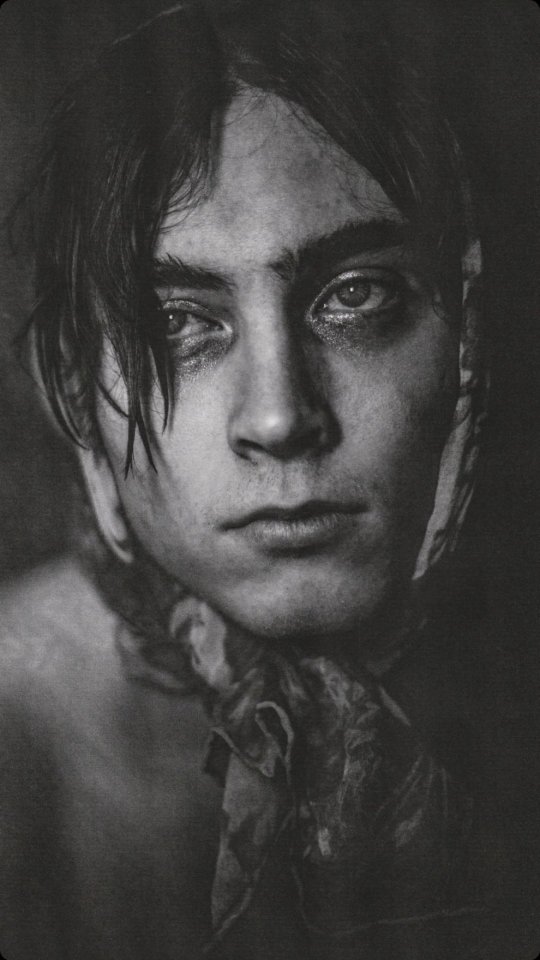
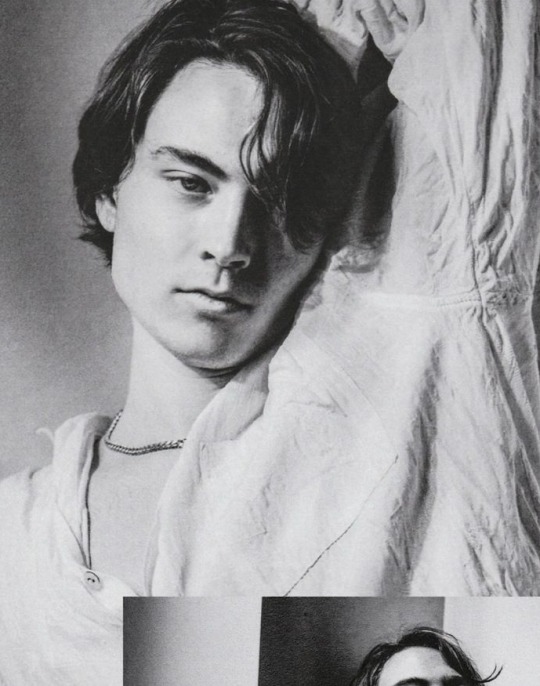


Note, this is not me trying to look smart and trying to talk about someone else's art pieces, although my dearest Daria made a small analysis on the Kris-Bojan set that I found very interesting, and it is interesting that these are a somewhat subjective views of Bojan and Kris's souls, or at least a visual representation of themselves as people. In any case, this is, if anything, an overview of what these art pieces make me feel and their significance to me.
First I must admit, as an artist, that these photos are beautiful and actually hold a lot of artistic value from my perspective. I think these should be seen as pieces of art and must be perceived in a different way than other Joker Out photos. However it is still very interesting how much these photos actually talk about the subject: these pieces are an exploration of Kris Gustin, the person portrayed, and I've honestly never have seen portraits that explore the nature of the subject in such a personal manner. Kris is displayed in a subjective, intimate way, whether how Damon sees him or how Kris himself sees himself deep down. I'm sure more elaborate and accurate explanations of Damon's art can be found online, as I actually didn't know of his work until now, but as I was able to read he focus a lot on the intimacy of the subject.
Anyways, there's a clear theme this session follows: femeninity and vulnerability. The usage of visible makeup (a first time for Kris on camera if I'm aware), the flowers, the exposed skin, the cloth (a typical femenine piece of clothing on Balkan/Slavic cultures), I think they were all choices to purposefully provide a more femenine vision of Kris. But he still allows himself to do poses similar to those I've seen him do before, there's still a hint of the Kris I know, his posing flows naturally and doesn't feel forced because this is just a natural extension of what he is, this is a natural exploration of his most femenine side, he is simply letting himself flow.
I think we all know Kris seems to be a man with a complex relationship with normative gender roles. Even as a cishet man he has this appearance and mannerisms that can be more related to a more "femenine" convention of gender and I have always wondered if he has ever struggled with this, and that if he has ever felt forced to keep the normative conventions of what a man should be. Things like asking to have his hair cut shorter after being called a girl when he was a child, or denying to be put makeup on by fans, he sometimes tried to run away from things that could be perceived as "feminine", maybe out of insecurity, maybe out of fear.
But there he is,
Glitter on his eyes,
Flower in his head,
Embracing himself.
I am a person with a complex relationship with gender roles. I was born a woman. I am short and tiny and have feminine features that simply cannot be ignored. I will forever be perceived as a woman by the people around me. I look like a girl, I have long hair because I am not allowed to have it short and I wear women's clothes. And while I don't want to be a girl, my relationship with femininity is actually very strong. I like pretty things, I like sparkles and pink, I like everything girly, I like girls. I've been told it's stupid to perceive myself as a guy since I look so girly, since I like so many girly things, and in times I don't feel I have deserved the masculine pronouns I use and my neutral name I've given myself (the ones I can only use online out of fear).
So I try to put some sense into it. I draw girly things because I like girly things. I draw men because I want to be like men. I draw men in pretty soft pinks and sparkles and sequins because that's what I am.
And I've found a safe place in Kris, with his non conforming masculinity that more often than not becomes femininity. As many other people like me, I like him because he helps me put sense to my feelings. I draw him in soft pastels and pretty clothes and delicate features because in my mind, if a man like him can be allowed to be femenine, then I can allow myself to feel the way I feel too. I can allow myself to simply not fit any binary gender convention, and I can allow myself to be myself. I like Kris because I find a part of me in himself, I relate to him and I see myself in his eyes. It is a complex relationship where I don't necessarily like him because I find him attractive, I am not actually sexually attracted to him; I see myself in him, in my own little weird way. I have distorted my own reality to make my own perception of him fit my needs. This is why I draw him the way I draw him. And perhaps that's why so many praise how I draw Kris. It is unique because it's personal. And I know he doesn't necessarily see himself this way, at least not in the degree I do. My Kris talks much more about how I see myself than how I see him. The way I draw Kris represents myself. My Kris is myself.
So when I saw him in this session, with the glimpse and the passion and the attitude I draw him like, it felt special.
"He looks like my art" I told myself. "He's seen himself the way I see him."
This is Kris,
This is my Kris,
This is me.
So I'm very thankful for Kris trying to open himself, and embracing this vulnerable side of him I purposefully push into the narrative of my art. He called these "therapy sessions", so I can't help but wonder if these have been helpful to him, if he has found something about him, if he has learnt to accept himself the way he is. He has helped me cope with complicated subjects of my life, and I cling to him to keep with life. He is my special little obsession that keeps me alive. So I can't help but sometimes wonder if he's happy, If he's loved, if he's content with himself.
And I think this exploration of himself will be very helpful to his soul. I am very proud of him, I am hopeful for his future, and I wish him the best.
I love you, my muse, and thank you for allowing yourself to see you with my own eyes.
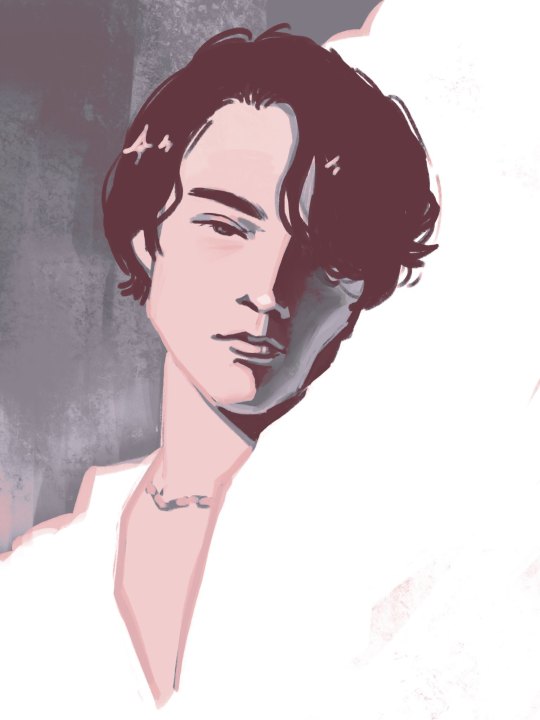
169 notes
·
View notes
Note
How do you analyze so good I'm really impressed and honestly wonder if I can learn from you
It's a skill, so the good news is, you can practice and get better at it!
Read A Lot/Gain Context
Analysis often means making comparisons or drawing from external context - one of the best things you can do if you want to be better at analysis is to try to cram your head with as much knowledge as possible. The time period, culture of origin, and where the author slots into those are usually major influences on a work (in Homestuck's case, much of it is a direct commentary on the internet culture it emerged from, and missing that part of it can drastically influence how the story reads).
Also important are the works the author themselves are inspired by. You've likely heard some variation of "nothing is original." We're actually really lucky with Homestuck in that regard, as the work is highly referential, and you can glean a lot by looking at what it references (for example, if you watch Serendipity, one of Karkat's favorite movies, which is titledropped during the troll romance explanation, you will understand Karkat so much better). This applies to things like mythological allusions - you'll hardly know why it matters that Karkat is a Christ figure if you don't know what the general outline of the Christ story is, nor will you pick up on the Rapture elements of Gamzee's religion or the fact that Doc Scratch is The Devil, etc. The key to picking up a lot of symbolism is being aware that the symbols exist.
And last, it helps to read a lot of media and media analysis so you can get a better understanding of how media "works" - how tropes are used, what effect language has, what other entries into the genre/works with similar themes/etc. have already done to explore the same things as the piece being analyzed is doing - and what other people have already gleaned and interpreted. I've mentioned before that many people seem to find Homestuck's storytelling bizarre and unique when it's actually quite standard for postmodernism, the genre it belongs to. But you're not going to know that if you've never read anything postmodern, y'know? I also often prepare for long character essays by reading other peoples' character essays - sometimes people pick up on things I miss, and sometimes people have interpretations I vehemently disagree with; both of these help me to refine my take on the matter.
Try to Discard Biases/Meet the Work Where It Is
Many will carry into reading media an expectation of what they want to get out of it. For example, one generally goes into a standard hetero romance book expecting a female lead, a male love interest, romance (of course), and a happy ending for the happy couple. If the book fails to deliver these things, a reader will often walk away thinking it was a bad book, even if the story told instead is objectively good and interesting. We actually see this a lot with Wuthering Heights, which receives very polarizing reviews because people go into it expecting a gothic romance, when it's really more like a gossip Youtube video spilling the tea on some shitty rich people (and it's really good at being that).
There's nothing necessarily wrong with this when reading for pleasure and personal enjoyment, but it presents a problem when attempting to analyze something. There's a concept called the "Procrustean bed," named after a mythological bandit who used to stretch people or cut off their limbs to fit them to a bed, that describes "an arbitrary standard to which exact conformity is forced." Going into a media reading with expectations and biases often results in a very Procrustean reading - I'm sure we've all seen posts complaining about how fanfic often forces canon characters to fit certain archetypes while discarding their actual character traits, etc.
Therefore, when reading for analysis, it's generally a good idea to try and discard as much bias and expectation as possible (obviously, we are never fully free of bias, but the effort counts) - or, perhaps even better, to compartmentalize those biases for comparison while reading. For example, Hussie talks at length about what they INTENDED Homestuck to be, and, while reading, I like to keep Hussie's words to the side while I try to experience the comic fresh, seeing what choices were made in accordance with Hussie's intentions, or where I think Hussie may have fumbled the messaging. At the same time, I try to let the work stand on its own, set in its proper context.
I'd say this is the number-one problem in fandom analysis. For example, people hear from the fandom that Eridan is an incel or a nice guy, so they interpret everything he says and does to fit that belief, or ignore any contradictory evidence. Or they fall for the character's façade that's meant to be dismantled by the viewer. Some works are fairly shallow and accessible, wearing all their meaning on their sleeve (or are Not That Deep, if you prefer meme-talk), and problems arise when a work is, in fact, That Deep, because someone biased towards the former will discard evidence that a work is the latter. This isn't exclusive to HS - it's happened in basically all of my fandoms - which is a statement to how easy it is to fall into this way of thinking.
Even without knowing that Hussie had coming-of-age themes in mind, for example, characters will talk about being kids and growing up. Knowing that Hussie has explicitly said that that's one of HS's themes serves as extra evidence for that interpretation, but the work itself tells you what it's about - if you're willing to listen to it.
Even If the Curtains are Just Blue, That Still Means Something
This is the next biggest fandom stumbling block - thr insinuation that when things in a work are put into the work without more explicit symbolism, that that means they're a discardable detail. This one is more about making a mindset shift - details aren't discardable, even if they don't appear to have been made with the explicit intention to mean something. Everything kind of means something.
First of all, whether or not the curtains are Just Blue is often highly dependent on the work. For example, in something made in large quantities with little time, staff, and budget - say, for example, one of the entries into the MCU's TV shows - there likely isn't too much meaning behind a choice of blue curtains in a shot (although you'd be surprised how often choices in these constrained environments are still very deliberately made). In a work like Homestuck, however, so terribly dense with symbolism and allegory, chances are, the blue curtains DO hold some special meaning, even if it's not readily apparent.
However, even in cases where a choice is made arbitrarily, it still usually ends up revealing something about the work's creative process. Going back to our MCU example, perhaps the blue curtains were chosen because the shot is cool-toned and they fit the color grading. Perhaps they were chosen because the director really likes blue. Perhaps the shot was filmed at an actual location and the blue curtains were already there. Or, even, perhaps the blue curtains were just what they had on hand, and the show was made too quickly and cheaply to bother sourcing something that would fit the tone or lend extra meaning. These all, to varying degrees, say something about the work - maybe not anything so significant that it would come up in an analysis, but they still contribute to a greater understanding of what the work is, what it's trying to say, and how successful it is at saying it.
And this applies to things with much higher stakes. For example, Hussie being a white US citizen likely had an effect on the B1 kids being mostly US citizens, and there was discourse surrounding how, even though they were ostensibly aracial, references were made to Dave's pale skin. Do I think these were deliberate choices made to push some sort of US superiority; no, obviously not. But they still end up revealing things about the creation of the work - that Hussie had certain biases as a result of being who they were.
Your Brain is Designed to Recognize Patterns, So Put That to Use
So with "establish context" and "discard expectations" out of the way, we can start getting into the nitty-gritty of what should be jumping out at you when attempting to understand a work. One of the most prominent things that you should be looking for is PATTERNS.
Writing is a highly conscious effort, which draws from highly unconscious places. Naturally, whether these patterns are intentional or unintentional is dependent on the author (see again why reading up on a work's context is so important), but you can generally bet that anything that IS a pattern is something that holds significance.
For example, Karkat consistently shows that he's very distraught when any of his friends get hurt, that he misses his friends, even the murderous assholes, that he's willing to sit them down and intervene on their behalf, despite all his grandstanding to the contrary. We are supposed to notice that Karkat actually loves his friends, and that he's lying when he says he doesn't care about them.
Homestuck is very carefully and deliberately crafted; if something comes up more than once, it's a safe bet to assume that you're supposed to notice, or at least feel, it. Don't take my word for it:
Basically, [reusing elements is] about building an extremely dense interior vocabulary to tell a story with, and continue to build and expand that vocabulary by revisiting its components often, combining them, extending them and so on. A vocabulary can be (and usually is) simple, consisting of single words, but in this case it extends to entire sentences and paragraph structures and visual forms and even entire scenes like the one linked above. Sometimes the purpose for reiteration is clear, and sometimes there really is no purpose other than to hit a familiar note, and for me that's all that needs to happen for it to be worthwhile. Triggering recognition is a powerful tool for a storyteller to use. Recognition is a powerful experience for a reader. It promotes alertness, at the very least. And in a lot of cases here, I think it promotes levity (humor! this is mostly a work of comedy, remember.) Controlling a reader's recognition faculty is one way to manipulate the reader's reactions as desired to advance the creative agenda.
But this applies to less deliberately-crafted work, too; for example, if an author consistently writes women as shallow, cruel, and manipulative, then we can glean that the author probably has some sort of issue with women. Villains often being queer-coded suggests that the culture they come from has problems with the gays. Etc. etc.
This is how I reached my conclusion that Pale EriKar is heavily foreshadowed - the two are CONSTANTLY kind to each other, sharing secrets, providing emotional support, etc. etc. It's why that part of my Eridan essay is structured the way that it is - by showing you first how consistently the two interact in suspiciously pale-coded ways, the fact that a crab is shown in both Eridan's first appearance AND his appearance on the moirallegiance "hatched for each other" page becomes the cincher of a PATTERN of the two being set up to shoosh-pap each other.
A work will tell you about itself if you listen. If it tells you something over and over, then it's basically begging you to pay attention.
Contrast is Important, Too
Patterns are also significant when they're broken. For example, say a villain is constantly beating up the protagonist. Here's our pattern: the hero is physically weaker than the villain. In a straight fight, the hero will always lose.
And then, at the mid-season two-parter, the hero WINS. Since we've set up this long pattern of the hero always losing to this villain, the fact that this pattern was disrupted means that this moment is extremely important for the work. Let's say the hero wins using guile - in this case, we walk away with the message that the work is saying that insurmountable obstacles may have workarounds, and adaptability and flexibility are good, heroic traits. Now let's say the hero won using physical strength, after a whole season of training and practicing - in this case, we say that the work says hard work and effort are heroic, and will pay off in the end.
In Homestuck, as an example, we set up a long pattern of Vriska being an awful, manipulative bitch, and a fairly remorseless killer. And then, after killing Tavros, she talks to John and admits that she's freaking out because she feels really bad about it. This vulnerability is hinted at by some of her earlier actions/dialogue, which is itself a pattern to notice, but it's not really explicit until it's set up to be in direct contrast to the ultimate spider8itch move of killing Tavros. This contrast is intended to draw our attention, to point out something significant - hey, Vriska feels bad! She's a product of her terrible society and awful lusus! While it's shitty that she killed Tavros, she's also meant to be tragic and sympathetic herself!
Hussie even talks about how patterns and surprises are used in tandem:
Prior to Eridan's entrance into the room, and even during, the deaths were completely unguessable. After Feferi's death, Kanaya's becomes considerably more so, but still quite uncertain. After her death, all bets are off. Not only do all deaths thereafter become guessable, but in some cases, "predictable". That's because it was the line between a series of shocking events, and the establishment of an actual story pattern. The new pattern serves a purpose, as a sort of announcement that the story is shifting gears, that we're drifting into these mock-survival horror, mock-crime drama segments, driven by suspense more than usual. The suspense has more authority because of all the collateral of unpredictability built up over time, as well as all the typical stuff that helps like long term characterization. But now that the pattern is out in the open, following through with more deaths no longer qualifies as unpredictability. Just the opposite, it would now be playing into expectations, which as I said, can be important too. This gear we've switched to is the new normal, and any unpredictability to arise thereafter will necessarily be a departure from whatever current patterns would indicate.
Patterns are important because they tell you what baselines the work is setting - what's normal, what's standard, what this or that generally "means." Contrast is important because it means something has changed, or some significant point is being made. They work in tandem to provide the reader with points of focus in the story, things to keep in mind as they read, consciously or unconsciously.
Theme
I'm talking about this stuff in pretty broad and open terms because stories are so malleable, and so myriad, and can say so many things. There are stories where horrible cruelties are painted as good things - propoganda is the big one, but consider all the discourse around romance books that paint abusive/toxic relationships as ideal. There are stories where the protagonist is actually the villain, and their actions are not aspirational, and works where everyone sucks and nobody is aspirational, and works where everybody is essentially a good person, if sometimes misguided.
This is, again, why outside context is so important, and biases need to be left at the door. For example, generally speaking, one can assume that the protagonist of a children's cartoon is going to be an aspirational hero, or at least a conflicted character who must learn to do the right thing. However, there are even exceptions to this! Invader Zim, for example, features an outright villain protagonist - a proud servant of a fascist empire - and for a lower-stakes example, the Eds of Ed, Edd, n' Eddy are the neighborhood scammers, constantly causing problems for the other characters with their schemes.
Thus, how do we determine what any particular narrative's stance on a given topic is? It's a difficult question to answer because every narrative is different. If I say something like, "the things that bring the protagonists success in their goals are what the narrative says are good," then we run into the issue of villain/gray morality protagonists. To use moral terms like "hero" and "villain" instead runs into the problem of defining morality within a narrative in the first place. But you have to draw the line somewhere.
So that brings us to themes.
Now, as with a lot of artistic terms, "theme" isn't necessarily well-defined (this isn't helped by the way the word is used colloquially to mean things like aesthetic, moral of the story, or symbolism). Wikipedia says: "In contemporary literary studies, a theme is a central topic, subject, or message within a narrative," but this is still very broad and hard to work with, so I'll give it a shot.
A theme is what a work says, beyond the literal series of events. Sometimes a theme is obvious - the theme of Boy Who Cried Wolf is that if you become famous for lying, you won't be believed when you tell the truth. Sometimes a theme is one of many - for example, Disney's Cinderalla says that kindness and virtue will eventually be recognized and rewarded, and that cruelty is interlinked with ugliness. Sometimes a theme is unintentional - for example, how Disney's body of work tends to villainize queer-coded characters. Sometimes context and the passage of time changes the theme - for example, Snow White originally held a message of hope for wartime families that domestic normalcy would one day return, but is now seen as anti-feminist as it appears to insinuate that a woman's place is in the kitchen, and her happiness is in marriage to a man. And sometimes a theme is not something you agree with.
In any case, a theme is a meaning to be gleaned from the text, more broad and universally applicable than the text itself. After all, we humans have traditionally always used story to impart meaning; our oldest epic, The Epic of Gilgamesh, contains within it several themes, most famously that of accepting one's mortality. It's startling, really, how applicable the story is to this day, even if specific details have become obtuse or unsavory to a modern reader.
This is, again, why it's so important to engage with a text on its own terms, in its own context, with as little bias as possible. A story's themes are not necessarily apparent, and commonly implied rather than stated outright, and approaching the story with expectations can easily lead to a Procrustean twisting of the facts to fit those expectations. A theme should emerge to the analyzer out of the reading, not the other way around.
Identifying theme gets easier with practice, and largely comes down to identifying patterns within the narrative (alongside looking at context and symbolism, of course). What does the narrative consistently touch base on? Are there any references; is there any symbolism? What does the story deem "normal," "good," or "bad"? How are ideas developed, and why? Why did these events happen, and are those motivations echoed anywhere else?
Homestuck is very complex and tackles many topics at once, and explaining why it's a coming-of-age would basically require a whole second essay, so I'll use a simpler and more popular example (like I've been trying to do) - let's say, Shrek.
The most obvious theme of Shrek is that beauty does not equate goodness, that one mustn't judge a book by its cover. The opening sequence is LITERALLY Shrek ripping out pages of a fairy tale book to use as toilet paper, and the movie ends with Fiona finding that her happiest, truest self IS as an ugly ogre. Shrek's main character conflict is that people immediately judge him as cruel and evil because he's ugly, and the characters' lowest points occur because Fiona is similarly insecure about her ogre half, considering it unlovable.
But there's other stuff in there, too. For example, if you know that Dreamworks and Shrek were founded after a falling out with Disney, then the beautiful, sanitized city of Dulac, with its switchback queue and singing animatronics add to this theme of a direct refutation of traditional Disney fairytale values, mocking them as manufactured, inhuman, and even cruel in the way that they marginalize those who don't fit an ideal of beauty. Again we see the opening sequence - defacing a fairytale - as support for this, but also the way that Dulac is displacing fairytale creatures. There's a moment where Gepetto literally sells Pinocchio, which can easily be read as a commentary on the crass commercialization and exploitation of fairy tales Disney likes to do.
And then, of course, there are lesser, supplementary themes. Love being a powerful positive force is one - Donkey is able to rally Shrek after he truly reciprocates Dragon's love for him (which echoes the theme of not equating goodness with beauty, as Dragon is still big and scary), and it's true love's kiss that grants Fiona her happy ending.
And then there's stuff that's unintentional. There's all this work done about how beauty =/= goodness, but then they made the villain incredibly short, which is a traditionally unattractive physical feature. So, does that mean that ugly things can be beautiful unless that ugliness is specifically height?
Sometimes, authorial intent does not match up with result - but in those instances, I think the most is revealed about the author. Modern Disney products tend to be very cowardly about going anti-corporation and pro-weirdness, despite their usual feel-good tones and uplifting themes - and that says a lot about Disney, doesn't it. That's why I think it's still important to keep authorial intent in mind, if possible, even if they fumble what they say they've set out to do.
Obviously, Lord Fuckwad being short doesn't REALLY detract from the overall message - but it's still a weird hitch in the themes, which I think is interesting to talk about, so you can see where personal judgement and biases DO have to be applied. There are two options here, more or less - either one believes that Shrek is making an exception for short people, who are of the Devil, or one believes that the filmmakers did a bit of an oopsie. Barring an outright statement from the filmmakers, there's no way to know for sure.
We can say a work has very complex themes when it intentionally explores multiple ideas very deeply. We can say a work has shallow themes when it doesn't have much intentional meaning, and/or that meaning is explored very lightly. The labyrinthine storytelling of Homestuck, with its forays into mortality, morality, and growing up, chock full of symbolism and pastiche and allusions, is a work with complex themes - especially as compared to the average newspaper comic strip, although they ostensibly share a genre.
We can say a work has very unified themes when these themes serve to compliment each other - the refutation of Disney-esque values, and love as a positive driving force, compliment the main theme in Shrek of not judging books by their covers, of beauty not equating to goodness. Ugly things are worthy of love, and those who push standards of beauty are evil and suck.
Similarly, we can say a work has unfocused or messy themes when the themes it includes - intentionally or not - contradict, distract, and/or detract from each other. Beauty has no correlation to goodness... unless you're short, in which case, you are closer to Hell and therefore of evil blood. To get a little controversial, this is actually why I didn't like Last Wish very much - there are approximately three separate storylines, with three separate thematic arcs, going on in the same movie, none of which particularly compliment each other - so the experience was very messy to me, story-wise, even though it was pretty and the wolf was hot. This is why we feel weird about Disney pushing anti-corporate messages, when they're a big corporate machine, or why it's easy to assume Homestuck was written poorly if you don't like Hussie - we want themes to be coherent, we want context to be unified with output.
Tone
Tone is somehow even harder to define than theme. It's like, the "vibe" of a work. For example, you generally don't expect something lighthearted to deal with the realistic, brutal tragedies of war. Maybe it'll touch on them in light, optimistic ways, but it isn't about to go All Quiet on the Western Front on the reader. By the same token, you don't expect fully happy endings out of the melodrama of opera, or frivolous slice of life from something grimdark.
Tone, too, is something people often wind up Procrusteanizing, which makes discussion difficult if two people disagree. If I read Homestuck as unwaveringly optimistic, with its downer ending the result of an author fumble, I'm pretty much going to irreconcileably disagree with somebody who reads Homestuck as though it's always been a kind of tragedy where things don't work out for the characters. Since it's even more difficult to define than theme, I'm not even really going to bother; I just felt like I had to bring it up because, despite its nebulosity, it's vital to how one reads and interprets a text. Sometimes I don't have a better answer for why I dislike a certain interpretation other than that it doesn't suit the work's tone. I generally try to avoid saying that, though, because it winds up smacking of subjective preference.
In summary... analysis is about keeping everything in mind all the time! But i swear, it gets easier the more you do it. Happy reading!
123 notes
·
View notes
Text
˗ˏˋ symbolism of colonial and imperial themes in Wicked analysis ´ˎ˗
!! i want to preface this by saying i'm not a professional critic, and this is not a 100% guide to anything either. do not take anything i type online to absolute heart, this is simply my personal interpretation of this piece of media !! (i also want to mention that i did not read the Wicked novel/series by Gregory Maguire)
! CONTAINS SPOILERS FOR ACT 2 IF YOU HAVE NOT WATCHED THE WHOLE MUSICAL !

(I don't care if this is reaching, but if you're interested PLEASEEEE HEAR ME OUT. also sorry for not posting, i was on vacation).
The musical Wicked serves as a powerful lens through which to explore themes of colonialism and imperialism. By examining the Wizard’s regime and its treatment of Elphaba, the Animals, and the citizens of Oz, the narrative critiques the mechanisms of domination and the moral compromises required to maintain power. The story’s parallels to historical and modern imperial practices offer a rich terrain for this particular analysis.
Well for obvious reasons, the Wizard is the colonial power. The Wizard represents the archetypal colonial ruler, an outsider who seizes control of Oz and imposes his authority over its diverse inhabitants. His rise to power mirrors the strategies of historical imperial regimes.
Such as cultural domination. The Wizard reshapes Oz’s culture and history to serve his narrative, erasing indigenous traditions and knowledge. For instance, the Animals, who represent the intellectual and cultural elite of Oz, are systematically silenced and marginalized.The propaganda machine, exemplified through Madame Morrible’s speeches and the Wizard’s public declarations, rewrites the truth to paint Elphaba as a villain. This rewriting of history is a hallmark of colonialism, where the oppressor’s perspective becomes the dominant narrative.
As well as economic exploitation. While the musical does not delve deeply into economic exploitation, the imagery of the Emerald City, with its opulence and excess, suggests a disparity between the ruling elite and the oppressed regions of Oz. This disparity evokes the colonial practice of extracting resources and wealth from colonized lands to enrich the imperial core.
Not to mention the not-so-subtle use of fear and domination. The Wizard weaponizes fear to maintain control, particularly through the demonization of Elphaba and the scapegoating of the Animals. By creating a common enemy, he unites the populace under his rule and diverts attention from his own illegitimacy. The division between “civilized” and “uncivilized” groups in Oz mirrors the hierarchical structures imposed by imperial powers, which justify oppression through constructed notions of superiority.
The marginalization of animals can be viewed as a powerful symbolism of indigenous treatment under colonial rule. Initially integral to Oz’s society, the Animals are systematically disenfranchised. The literal silencing of the Animals—stripping them of their ability to speak—symbolizes the erasure of indigenous languages and cultures by colonial regimes. This act of linguistic and cultural annihilation is a powerful tool of imperial control. The Animals are forcibly removed from positions of power and relegated to the margins of society. Dr. Dillamond’s dismissal from his teaching position is emblematic of the broader exclusion of marginalized groups from education and leadership under imperial systems.
Elphaba embodies the experience of the colonized subject, 'Elphaba the colonized other", marked by her outsider status and demonization. As a green-skinned woman, Elphaba is visibly different, making her an easy target for societal prejudice. Her defiance of the Wizard’s authority positions her as a revolutionary figure, challenging the imperial order. Elphaba’s struggle to assert her identity in the face of systemic oppression reflects the tension faced by colonized individuals who resist assimilation. As well as the Wizard’s portrayal of Elphaba as the “Wicked Witch” highlights how colonial powers delegitimize resistance by framing dissenters as dangerous or evil. This tactic suppresses rebellion and justifies the empire’s violent actions against the oppressed.
As well as Glinda’s role in perpetuating imperialism. Glinda’s journey offers a nuanced critique of complicity in colonial systems. While she initially benefits from the Wizard’s regime, her eventual disillusionment highlights the moral compromises required to sustain imperial power. Glinda’s rise to prominence under the Wizard’s rule exemplifies how imperial systems reward those who conform to their norms, even at the expense of justice.Her initial indifference to the plight of the Animals and Elphaba reflects the apathy of those who benefit from colonial structures without questioning their ethical implications. As Glinda begins to recognize the Wizard’s tyranny, her shift in perspective symbolizes the potential for allies within imperial systems to challenge oppression. However, her complicity underscores the difficulty of fully extricating oneself from such systems.
And as my last point, the Empire's fall. The downfall of the Wizard’s regime is a hopeful counterpoint to the devastation wrought by colonialism. Elphaba’s resistance and the growing awareness of Oz’s citizens suggest that imperial systems are not invincible. The narrative emphasizes the power of collective action, with Elphaba’s defiance inspiring others to question the Wizard’s authority. The liberation of the Animals and the exposure of the Wizard’s deceit demonstrate that resistance, though fraught with sacrifice, can lead to systemic change. It still has however moral ambiguity, despite the Wizard’s fall, the damage done to Oz and its inhabitants lingers, reflecting the long-lasting scars of colonial exploitation. This ambiguity challenges the audience to consider the complexities of decolonization.
In conclusion, Wicked offers a compelling critique of colonial and imperial systems through its portrayal of the Wizard’s regime and the resistance led by Elphaba. By examining the mechanisms of oppression and the resilience of the oppressed, the musical invites audiences to reflect on historical and contemporary forms of imperialism. Ultimately, Wicked reminds us that challenging systemic injustice requires courage, solidarity, and an unwavering commitment to truth.

#wicked#elphaba thropp#elphaba x glinda#glinda upland#media analysis#media#media art#wicked 2024#wicked movie#wicked fiyero#wizard of oz#lgbtqia#broadway musicals#tumblr fyp
28 notes
·
View notes
Text
Queequeg's lack of autonomy: features or bugs?
You know, I wanted this to be a proper analysis, but the stressed, sleep-deprived, busy self can only do a semi-ramble, semi analysis.
So I said how Queequeg's lack of autonomy and individuality is not a bug, but a feature.
Just so we are on the same page, I will prove how Queequeg is very obviously lacking in autonomy:
Queequeg: Must be nice. Queequeg: Knowing what you want. Knowing what you desire.
Canto V's dungeon: Floor 2
No… You devoured the crew whole. You painted over their wills, just like the Whales— no! Just like the Pallid Whale! Molding them and shaping them to fit your wants and needs.
Canto V's dungeon: Floor 3
Queequeg: Too late to think. About what is right and what is wrong. To think for myself. Too late.
Canto V's dungeon: Floor 3
The whole dungeon, she was obeying Ahab's orders, getting dragged around and around. Utterly lacking in agency is her main characteristic in her Pequod time, but there is a case to say it wasn't so during her Middle-arc. After all, she did say:
Queequeg: So I killed. And killed. And killed. Not because of orders. Killed with my own hands. Because I wanted to. Because I wanted respect as Big Sister.
I don't doubt her words. However, tribalistic as the Middle is, I think we can speculate on how much of Queequeg's actions stemmed from her own desire, and how much was her complying to its culture without even knowing it.
Either way, even if you disagree that Middle Queequeg was lacking in agency, it's hard to argue that she wasn't in her Pequod times, so we can assume that is a major trait of hers.
Let's go back to The Little Mermaid by Hans Christian Andersen for a sec. I will assume that you are convinced that one of Limbus Queequeg's inspiration is The Little Mermaid. If you are confused with that statement, please read:
The Little Mermaid wants to seek an immortal soul by getting the prince to marry her. I think it is a misconception that she did all (abandoning her family, enduring pain with every of her steps, sacrificing her voice) for love. No, she wants more than that: she wants an immortal soul. There could be a religious reading here, but it is neither relevant to my point nor am I qualify to state it, so I'll leave it. However, one could see how the arrangement of a woman having to win the love of a man and devoting her entire self to him to attain her spiritual fulfillment is very unfair, misogynistic, even. (Unfortunately, I can't explore that theme in Limbus Queequeg's story because sexism apparently doesn't exist in the City and also there are no prominent men in her story either?)
Here, I can go on about traditional heroines and how they are mostly quite lacking in agency too, but I haven't done researches for that. And more, importantly, this trope was intentionally subverted in The Little Mermaid. Hans Christian Andersen is much smarter than me, because he wrote it.
The Little Mermaid isn't just a damsel waiting for someone to save her. Her two displays of her agency are 1. finding the Sea Witch to get a pair of legs and 2. not killing the prince. She has a goal (attaining an immortal soul) and a principle (her love for the prince?) that she holds steadfast. Unfortunately, the one thing that she has been after, the prince's love, is not something that she can control. She can try to seduce him, sure, but his affection is his own. And, without it, she can't get an immortal soul...
But that isn't true, is it? The Mermaid didn't just die and turn into sea foam, fated to never get her immortal soul. She became a daughter of Air. And, with enough good deeds, can gain her own soul. Fortunately for her, this time, the task of getting her soul depends much, much more on herself.
This writing choice is quite intentionally, I believe. I wanted to read more about it, I really do, but the link they cited on Wikipedia led to an Internet Archive article that has been downed (RIP). Anyways, the gist of it is Andersen took inspiration for The Little Mermaid from Undine, in which a water spirit indeed got her immortal soul by marrying a human knight. Anyways, this is what Andersen allegedly wrote to a friend about it.
I have not, like de la Motte Fouqué in Undine, allowed the mermaid's acquiring of an immortal soul to depend upon an alien creature, upon the love of a human being. I'm sure that's wrong! It would depend rather much on chance, wouldn't it? I won't accept that sort of thing in this world. I have permitted my mermaid to follow a more natural, more divine path.
The point, I think, is that the Mermaid doesn't really need the prince's love to gain an immortal soul. That is something she can obtain herself, what she deserves after so much sacrifices, the rewards for her virtues. After the Mermaid was at the mercy of the prince for half of the story, she was given a chance to do good by herself. The opportunity of attaining an immortal soul returned to her.
I just argued above that Queequeg doesn't have autonomy, maybe even from her time in the Middle, but I lied (again). Queequeg also has two acts of agencies her own 1. running away from the Middle and 2:
Queequeg: Dante. Something I wish. Queequeg: I want… Ishmael to… Queequeg: … find her way.
Canto V's Dungeon: Floor 2, and

Woah, those two acts perfectly match the Mermaid's too, wonder how did that happened.
That was Queequeg's only wish, and that was just a bit after she said she was jealous of the Abnormalities for having wishes too :D
Queequeg also got her immortal soul, but...
This is when I think the story falls flat, if you hyperfocus on her. And you...shouldn't have. She is an NPC, who is dead. Only weird nerds like me would analyse the story in her perspective. This is not really a criticism for Canto V or PM's writings (although I do have a problem with it sometimes). I think they did the best they could to flesh out and gave Queequeg a proper ending with the little screen time she got (unlike that one other dead NPC from another franchise that I used to hyperfocus on).
However, what did The Little Mermaid have to do to get her immortal souls? She has to do 300 years worth of good deeds. Even though we didn't get to see it, we can assume that she struggled and grew even more to attain her goal.
What did Queequeg do to get her immortal soul? Um...uh...
Queequeg didn't really grow in the quest. When reunited with Ishmael, "her broken heart" got "unearthed". She nurtured a wish for herself: for Ishmael to find her own path. But, ultimately, she was still...following Ahab's orders. We still have to fight her twice (and thrice if you count her EGO phase).
Queequeg had character developments during her time on Pequod (mostly with the influence of Ishmael). She learned to look forward and to have hope. That got rolled back.
So, essentially, Queequeg got rewarded for...nothing?
Her story has ended. She couldn't do anything to actually gain her immortal soul, her atonement anymore. She is still quite lacking in autonomy. And I think that is a real shame, a bug, even.
That is one of the reasons why I made that swap Ishqueg AU.
______________________________________________________________
I know characters lacking in agencies are often seen as bad written, and a lot of times, they are. However, there is a certain charms to characters who have been deliberately written to have next to 0 agency. This actually reminds me of Iwakura Michihiro from Genshin Impact, an actually pretty prominent NPC in Inazuma's lore, whose only 2 acts of agencies in the lore were 1. leaving home to live in the woods (this one is debatable because he was abused and perhaps driven from home would be a more correct term) and 2. naming his sword. Anything else he did were instructions from his bully/mentor/friend/crush/saviour. And also Carter Scherbius, another NPC from Genshin Impact, who was terminally ill and then turned into goop in an effort to save him and later reincarnated for an experiment.
There is something quite heartbreaking and even beautiful about seeing a characters being dragged and beaten by the narrative. It's relatable. Real people, we, don't usually have control of our lives most of the times. We are dragged around and the beaten by forces we can't understand. We are usually helpless against our fate.
And, what kinds of people who would usually feel helpless against the sheer incomprehensibleness and the cruelty of our vast world? Sailors.
#lcb ishmael#limbus company#project moon#lcb ishqueg#lcb queequeg#analysis#queequeg#ishmael limbus company#rambles
24 notes
·
View notes
Text
Some thoughts:
The Wheel of Time is a piece of literature and it’s okay for people to interpret things in different ways or have the text resonant differently for you than another fan. And that even if you find some interpretations/ships/character arcs that people are interested in distasteful, that doesn’t necessarily mean that you are right and the other person is wrong, and vice versa.
Sure, some opinions might be based more in canon than others, but RJ was an author that was deliberate in leaving room for ambiguity, misunderstanding, and critique in his characters, relationships, plots, and cultures. He also was creating a framework of the world in WoT that might have not completely reflected his own beliefs but rather an attempt to create an interesting world and power system. Canon should of course be the stable foundation of any fandom and it’s important to remember what is canon and what is not. But is also important to remember that canon can be interpreted or critiqued in many different ways.
If someone is not actively taking a bad faith approach to the text (ex: blatantly misogynistic takes on Egwene, Elayne), I feel like we have to allow multiple interpretations of the text because two contradictory views can be true at once, especially in a work as complex as the WoT.
Some examples:
- RJ’s tendency to pair women characters up with a heterosexual partner by the end of the series can be critiqued for being misogynistic. However you could argue that he was trying to fit the theme of balance between genders. You can also find a particular ship out of these pairings interesting and want to explore it more through analysis or fic. ALL three of these things can be true. You can also not agree with some or any or all of these points without completely invalidating that other fans see it this way.
- Some fans find polyamory representation they relate to in Rand having three girlfriends/wives. Other fans critique it as a misogynistic trope. Both interpretations can be valid.
- Similarly, in different wot fandom spheres Elayne and her relationships are seen different ways. Some fans insist she’s straight, some that she’s bisexual, and others that she is a lesbian who experienced compulsory heterosexuality in her relationship with Rand. These fans all have their own reasons (namely, in order: her only canon relationship is with Rand; her first sister bond and relationship with Aviendha can be interpreted as romantic in addition to her relationship with Rand; and some find the difference in chapters/care/detail that RJ gave Elayne and Avi’s relationship compared to hers with Rand to be a compelling argument for comphet). The text and a healthy fandom allows for all of these interpretations, even if you may personally disagree with some of them.
In short, consensus in fandom is great, but allowing for differing opinions and healthy dissent is better, especially with a text as rich as the Wheel of Time.
71 notes
·
View notes
Text
A Look into My Witness/ Destiny Cultural Project!
Greetings!! In order to help organize my cultural project (that I am still working on, so everything here is still malleable as my understandings and drafts change!), I decided to share with you guys what I aim to tackle (warning, I’m not a professional by any means)!
My project is a very causal one that will be used to form discussions with others. My goal is to encourage people of my culture to tell passionate and authentic stories after years of pressure to be docile to Western ideals, using the Witness and its role in Destiny to show that there are universal themes and antagonists we can portray to a worldwide audience!
I’ve been hopping around getting interpretations about Destiny in order to understand how others perceive a story that can be read to resonate deeply with our experiences.
For context, I am using this reading, inspired by my cultural experiences, to compare interpretations against and form this project: the greater story of Destiny is about how the indifference of the universe and its tendency to act in ways people see as cruel paired with the questions left by its silence drive people to seek an answer to it that is objective/perfect out of fear and pain, failing to realize that there is no one way to look at those aspects of the universe spiritually and that the pursuit of enforcing purpose leads to cutting away at beliefs/people that you deem a threat to your paradigm.
That fear of uncertainty and the inability to make the universe act the way you wish it would often leads to individuals forfeiting a personal existential pursuit in favor of assurance within a collective belief system that gives them a sense of safe, objective meaning; a system that can cause long lasting devastation, but can be defeated by choosing to fight alongside others to protect diversity and the right to self autonomy, even if that means living in a world that can cause pain alongside others that can choose to be immoral.
I relate this to an exploration of Caribbean culture against imperialism, specifically religious imperialism, and talk about beliefs/ideas like Myal, Obeah, Vodou, Evangelism, Fundamentalism, and Négritude.
Here’s what I have as categories!
A Silent Universe is One Open to Interpretation for All- Understanding the Traveler/Gardener’s role in Destiny’s narrative and how that leads into creating stories inspired by its dedication to free will as well as our own culture’s interpretations on the roles of the universe’s forces and divinity (with personal additions added from my experiences of focusing on scorning the universe instead of helping others understand their place in it as a partial result of people forcing the narrative of an omnipotent, omnipresent, all knowing God into fitting the white supremacist theory that slavery was earned via the lineage of African individuals to Ham from the Bible)
Don’t Submit to the Indifference of the Cosmos, Work in Spite of It- Understanding the Veil/Winnower’s role in the Destiny narrative and how that can enrich stories involving fighting against Social Darwinism and dogmatic cruelty (discussion of the hive occurs here)
Do You Need Salvation? I Don’t, but You Do- Understanding how the ideas that the Gardener and Winnower represent lead to the creation of the Witness and using that to sympathize and understand the behaviors of “Precursors” in our real world; an argument against the notion that ethics is only for “civilized westerners” and that religions with vertical morality/a “perfect”, blissful afterlife are the objective truth
We Don’t Want the Ends and We Sure as Hell Don’t Want the Means- An analysis on the intentions of the Precursors and how far intentions can be valued in stories that focus on the consequences
We Fight Systems, Not People- An exploration on how the decision to make the Witness it’s own being outside of the Precursors makes it a powerful representation of how individuals can harm themselves to make an oppressive system that is more than their individual actions
It is Beauty Amongst Ugliness- An exploration of how Destiny’s support of fighting for hope and personal freedom against insurmountable odds shows a potential interest from general audiences for Caribbean stories of maintaining hope in desolate conditions; a discussion on how tales of black triumph has a place on the world stage
You Look at the Sands, I Look Beyond the Horizon- A discussion about how more communal groups that are close to their cultural identity might focus on the more societal, large scale implications of a story rather than the more personal implications individually minded people see first, something to be aware of and acknowledge when creating cultural fiction (with observations about Witness interpretations and other pieces of media, like Dev Patel’s movie Monkey Man) (please note I am not demonizing any type of interpretation, I just think it’s important to consider that people have different scopes in order to avoid frustrations in story telling)
Disciples, Taken, Dread, and Zombies- An exploration of “zombification” (as used in the book Myal by Erna Brodber) to explain the treatment of the Witness’ forces and relate it to how imperialistic acts aim to strip people of cultural/religious identity to use for the perpetuation of its ideology
I Hope That’s Dread You’re Feeling - A discussion on how, after years of intimidation from oppressive powers, fiction can be used to cause negative reactions in audiences that move them to take our issues and stories seriously (with pieces of the Witness’ abuses, manipulations, and mutilations described); a discussion on the importance of fostering a Lordean Rage in depictions of abuses as well as the exploitation of black bodies (with additions from Myisha Cherry’s book The Case for Rage)
Leaving Lubrae Won’t Save You- An analysis of how Rhulk can be interpreted as a metaphor for zombification; how imperial powers seek to prey on the vulnerable and frustrated to isolate them, instill in them their ideology, and turn them on people who struggled just like them with promises of salvation (with additions from Derek Walcott’s Dream on Monkey Mountain play and the book The Wretched of the Earth by Frantz Fanon)
You Can Look at it This Way, or That Way, or That Way Too- An overview of some of the historical/mythological/cultural/philosophical/psychological references in Destiny that are key to understanding the world building and how Bungie uses them to enrich the game’s themes; a discussion on how we are not alone in our struggle to prove we have a right to existence and expression
You Should Always Aim to Do Better- A discussion of some of the narrative shortcomings in Destiny, especially involving racial biases (intentional or not), that storytellers should be mindful of when developing narratives or using cultures to inspire antagonistic forces
Is it Human? Male? Female? No, it’s Evil- A general discussion on the design of the Witness paired with more specific observations on how people interpret it’s gender; a detailing of personal observations on how whether the Witness is seen as masculine or feminine often coincides with what traits/interpretations of it are given attention, related to how imperialism is often seen as a masculine force
The Stars Were Made for Us Too- An encouragement to people of my culture to not shy away from implementing our experiences in sci-fi and fantasy settings based on some of the aspects people admire about Destiny (inclusion of varied forms of gender expression and sexualities, poc from different backgrounds being main characters, etc.) (with additions from a visual arts thesis a friend of mine is producing about black mythology and the novel Their Eyes Were Watching God by Zora Neale Hurston)
If you guys have any questions or want to participate, go to my pinned post and comment on it/Dm me personally! I’m still accepting responses to my questions and lore/references that could help me out, and I thank everyone who shared that post! Thank you for your time and I’m so excited to keep working on this to refine it more!
#destiny 2#destiny#destiny the game#d2#the witness#destiny witness#destiny the final shape#the final shape#oooooooo this is so scary to post I’m not joking#but!!! I’m being very brave!! and sharing my opinions!!!#the final shape and destiny in general changed my life and made me take pride in existing#im so excited for this project and speaking event#the witness and the traveler and the veil means the world to me#and their story made me break out of a mindset that kept me angry at an idea of the universe I didn’t have to have#im forever grateful for destiny’s story and I want to speak to others the way it did me#it certainly isn’t perfect and there’s so much I don’t like about it#but it changed everything and I think it could be of use to others#let me know if you have any aid you’d like to provide for this project and I want to thank everyone who has been a massive help#it’s been so nice talking to people from across the globe and with different backgrounds on this#as well as learning more about my own culture#the traveler destiny#the traveler#the veil destiny#the veil#rhulk#rhulk destiny#destiny hive#none of this is an attack or disregard for any of interpretation of Destiny btw#and no identities are given out for people who offer their takes#sorry if there are typos
13 notes
·
View notes
Text
Having recently finished an (overly-lengthy) analysis of Tech's development and now working on one for Wrecker, I've been thinking a lot about each of the main characters' arcs. So here, y'all get a summary:
To start off with, it seems each of the titular characters' arcs (with the exception of Omega) revolved around answering one of the main themes of the show, a theme that affects all of the clones:
“We were born and raised to be soldiers of the Republic. It is our entire identity, culture, and purpose. So what do we do when the Republic is now called an Empire, the war we were born for is over, and we face the possibility of being replaced? What are we if we are not soldiers?”
The first question of “What do we do when the Republic is now called an Empire?” is answered quickly: Crosshair joins the Empire, the others don’t.
The second question – “What are we if we are not soldiers, can we be anything else?” – takes longer to answer, because even though Hunter, Echo, Tech, and Wrecker decide within one episode that they won’t be soldiers to the Empire, they continue acting as soldiers and functioning as a military unit (why wouldn’t they, it is literally all they know). Even building relationships with Omega and protecting/caring for her involves them taking an adolescent clone with no military training and teaching her how to be a soldier working with a squad. Whether they are soldiers for a cause, soldiers who have left a cause (deserters), or soldiers for hire (mercenaries), most members of Clone Force 99 take a long time to consider other roles, purposes, and identities beyond being a soldier.
- Crosshair: his arc is the most obvious as he goes from clinging so tightly to his identity as a soldier that he is willing to walk away from his family and throw in with the Empire, to eventually discarding the soldier life completely after the Empire abuses his loyalty, and ends retiring with his family on Pabu. His answer to the second question seems to be "I'm still figuring that out, but I know I don't need or want to be a soldier anymore; and more importantly I know who deserves my loyalty, and that's enough."
- Hunter: he feels he needs to remain a soldier/mercenary to protect his family from the Empire (and from blackmail), and he has a difficult time letting go of that role even as other options open up to him. It takes the loss of one of his brothers to convince Hunter to give up the soldier life “for good”… until he gets dragged back into it, but he stays fighting as a soldier only long enough to recover what he can of his family, ensure their safety, and peripherally help another brother (Echo) as needed. His answer to the question seems to be "People keep telling me there are more options than being a soldier, but there's never any time to really explore these options or let down my guard. Oh, look, here comes another disaster." It isn't until the end of the show, when he finally has a chance to breathe, that he says they, like the other clones, can finally be "Whatever we want."
- Echo: he deliberately chooses to stay in the fight and continues soldiering, but for a bigger cause he believes in and one that aligns with his ideals. His answer is essentially “I guess I could be something else, but I want to continue being a soldier. It's how I can best help ALL my brothers."
- Tech: he remains a soldier in order to help his family, but as he begins to see history, culture, traditions, and life existing well beyond the war he was born for, he is one of the first to openly express an interest in pursuing possibilities outside of the soldier expectations (stay on Pabu, help the community rebuild, spend time with Phee, etc.) His arc is cut short before these possibilities can come to full fruition, but he did have an arc in that he answered the question with “I am a soldier, AND I can be more.”
- Wrecker: he has no problem sticking with the soldier-like roles, though he also has no difficulty integrating into other communities and helping them out - so long as there is action involved. He'll stay in one place if that's what his family decides to do, though they don't officially decide to do it until Tech dies... And it's only thereafter, when Wrecker is left the last man standing to keep Hunter from going off the deep end, that Wrecker begins to not only advise Hunter, but also advise caution. His goals shift from action/thrill seeking and helping his family, to being more selective in order to help his family. His answer to the question is "Being a soldier was fun, but now I see and understand the risks of staying in the fight. I don't care if I'm a soldier or not, I'm open to new things, as long as I'm with my family and they are safe."
While Omega is the exception in that she doesn't necessarily answer the same questions her brothers have, but - like most coming-of-age stories - she still eventually has to answer the question of who/what she wants to be, so:
- Omega's arc takes her from being a clone with no military training (who doesn't even know what dirt is), raised by brothers who for most of their lives had no choice but to be soldiers... to a young woman who has been trained by the best, has the option of staying out of the fight, and chooses for herself to become a soldier.
#the bad batch#star wars the bad batch#tbb analysis#tbb hunter#tbb echo#tbb tech#tbb wrecker#tbb crosshair#tbb omega
38 notes
·
View notes
Note
people act like wanting to discuss how anya being male would affect the story/the themes erases the actual game from existence, like is gone or somehow cheapened by fans doing what fans do
i think you don't like those (happy) ending baby aus and neither do i but it kind of feels similar where the exploration of possibilites is discouraged entirely or considered disrespectful towards the source material or a sign that the fans don't understand the original message which is such a weird viewpoint to have
especially because i think the game lends itself to these kind of conversations/fan content... bc yeah while it wouldn't be the same if anya was male, but that doesn't mean you can't use a male anya au to criticize the patriarchy/rape culture? it would maybe help some people to look deeper into an au like that especially bc it would require THEM to use their brain and maybe confront their own biases
It’s like a ridiculous thing to be so upset about in my mind because it comes from a place I keep seeing in this particular fan space of people interpretaing personal views as like canon analysis.
It’s a game that deals with multiple sensitive topics on a lot of different fronts and of course a lot of the fans are going to go about engaging with it in different ways. Too many people are getting mad at others for depicting things in ways they don’t like even if it comes from a place of personal experience with the subject matter or other real life lived experiences.
I don’t like the idea that Anya has to keep the baby but it’s not unheard of that victims end up having to and it’s not evil or missing the point to admit that or explore it through an au. It’s not happy nor do I think it’s a post canon fix it like some are deposited as but from what I’ve seen of them I’ve only gotten ones that are real and upsetting and deal with the stress of having to care for your rapist child. Again, the concept of Jimmy refusing to take responsibility and forcing it on to others even when they shouldn’t have to.
With the idea of male Anya and female Jimmy the conversation of autonomy, patriarchy, sexism, misogyny and rape culture can still very much happen. It is a lot more nuanced and muddied just due to how male victims are addressed, if addressed at all, but to think it disregard the points of the game means you have a shallow understanding of all of the themes at play in tandem. The idea it’d affect his life less completely misses the point he would feel a shame and guilt about being assaulted by a woman but it fostering a child. Many people in real scenarios would assume he’s only saying it wasn’t consensual because he doesn’t want the kid despite discomfort and fear around Jimmy. Theres the idea that Jimmy would guilt him to care for the baby and thus her back on earth which furthers the idea of being stuck with you abuser along with how Anya may be compliant because men who defend themselves are still seen at fault. If everyone’s gender is swapped it opens the discussion of how women can be complacent in n rape culture too.
I think a sign of a good piece of media is if enables transformative conversation on the subject matter. I think the issue people are having is not understanding that there isn’t one right way to act in the scenarios we were given, that victims find themselves in. It’s a lot of people getting upset at others who react differently and acting like putting those opinions out there is damaging when it’s just another real perspective someone is either opening up and sharing or trying to depict.
#ask#anon#like it’s so confusing because you don’t have to fuck with it but acting like it inherently comes from a lack of understanding is crazy#the pregnancy can play out in a lot of ways in this flipped scenario and I don’t think it takes#away from Anya’s role to make her a guy but shows that what Jimmy did was deplorable no matter what#it changes the way her autonomy is affected but that means you have to work harder to explain why it’s just as bad like I can’t believe some#one said it’s not as bad for guys like it isn’t just guy Jimmy on guy Anya it’s a complete flip like the bay is still there it won’t happen#I just like I feel like I’m going crazy in this space like damn#any way pls send or asks about anything sillier or different this shit is pissin me off#mouthwashing#mouthwashing game
17 notes
·
View notes
Text
Sumeru's war on Nietzsche (part 1)
One of the main themes of the Sumeru chapter is the victory of altruistic values over egoism, specifically the egoism in Friedrich Nietzsche's philosophy.
I want to point out these connections so we can agree from the getgo on Nietzsche’s presence in the chapter:
Kaveh defeats nihilism in Parade of Providence, and the defeat of nihilism is one of the main goals of Nietzsche's philosophy
Achievements in the Khvaena of Good and Evil quest are named after Nietzsche quotes
Sumeru is mostly inspired by India, Iran and Egypt, and Nietzsche had a bone to pick with the philosophical influence of all three in the west
The themes of egoism and altruism are explored through the work of western philosophers and the philosophy of eastern religions, following the real life historical interrelation of both. And because the outcome of this confrontation favors altruism more, I also think it can be interpreted as a rejection of western values of individualism as a whole.
Nietzsche has the leading role for this analysis for clarity's sake (or else it'd end up in 15k words) but the philosophical material used in the region is vast and varied.
Egyptian influence
Nietzsche blamed Egypt for influencing Greek philosophers like Plato (public enemy #1 of Nietzsche) in his conception of goodness. Philosophers of ancient Greece would go on to influence western philosophy and institutions.
Nietzsche thought that developing the idea of objective goodness which one should aspire to and be governed by is where the ancient Greeks went wrong as a society, disrupting the balance between the rational values of the god Apollo and the frenzy of the god Dionysus that made ancient Greece an ideal society in Nietzsche's eyes. The clash of order and chaos is what made Greek culture rich in his opinion, so introducing a code of ethics ruined the dichotomy.
This concern with goodness was of course Plato's fault, who most likely was influenced by the Egyptian concept of Ma'at. Ma'at can basically be understood as a moral principle that guided both Egyptian society in its religious beliefs and its institutions.
In Genshin Cyno’s character is inspired by the god Anubis and one of his main motifs is the scales, his personal drive is also the pursuit of justice and order. This is likely because in Egyptian mythology Anubis weighs the hearts of the deceased against the feather of Ma'at.
So here we have the character inspired by Egyptian culture who personifies the ancient concept of morality that Nietzsche blamed for ruining a society he considered advanced.
Indian influence
The philosopher Arthur Schopenhauer was initially Nietzsche's role model, but he'd later become his biggest critic due to the ideas promoted by his philosophical system.
Schopenhauer borrowed elements from dharmic religions (Buddhism and Hinduism) to construct his ideas, mainly the concept of Brahma (a universal consciousness which originated all creation and it therefore presents the world as a unity) and the concept of desires as the basis of suffering (therefore desires have to be suppressed).
Nietzsche considered this philosophical approach to be pessimistic, arguing that it easily led into nihilism. He thought similarly about Buddhism (although he held it in higher regard than Christianity) for being a religion that denies the self and devalues the world, only considering it a transitory illusion that had to be escaped. Nietzsche aimed for the complete opposite: giving value to the world as it was and indulging in one's own individuality, independent from collective constraints.
In Genshin I think the concept of Brahma is close to the plot of the sovereign dragon Apep, who creates life that later goes back to it in Nahida's second story quest. Buddhist philosophy is covered in Wanderer's arc, which I analysed here.
Iranian influence
Iran and India share common ancestors, so their religious practices also have common traditions (such as the worship of nature), hence why they largely make up most of Sumeru’s inspiration. The ancient religion of Iran is called Zoroastrianism, things like the Akademiya darshans and the House of Daena are named after its religious principles, as well as the overall region where the quest Khvaena of Good and Evil takes place.
Zoroastrianism was founded by Zoroaster, who conceptualized the world as a conflict between good (originated by the creator god Ahura Mazda) and evil (influenced by the entity Ahriman) where humans have free will to choose between the two.
This cosmology would later influence the abrahamic religions (Judaism, Christianity and Islam) and, in Nietzsche's view, originate the western perception of morality he was critical of.
He used the prophet Zoroaster (known in Germany as Zarathustra) as his own character in the book Thus Spoke Zarathustra to voice his ideas of a new kind of man that could overcome this morality that Europe had submitted to under the authority of Christianity. This way, since Zoroaster was the one to introduce morality to the western world, so would he be the one to denounce it.
Historical context
The philosophical confrontation between egoism and altruism began in the aftermath of the French revolution, when European countries formed into republics. The threats of democracy, liberalism and socialism loomed over the aristocratic class and the societal status quo, which produced reactionary responses in the shape of individualism and egoism: the exaltation of the individual over the collective majority.
Nietzsche himself took part in (and built his ideas around) this reactionary response, he argued that the purpose of society was producing culture, which could only be achieved by the subjugation of one class to support the elites who could produce the art that the inferior class was supposedly incapable of producing. He denounced democracy, the egalitarian cause of liberalism and the class equality of socialism of attempting against this purpose, and he used the altruistic values of religion as a scapegoat that collectively addressed the three.
Nietzsche's philosophy
In this sense, Christianity was a method of control to suppress the individual from the basis of resentment —here's where the master and slave morality dichotomy he authored comes from: the subjugated class, in his theory, motivated by feelings of resentment and powerlessness against the elites, would develop values of humility, altruism and collectivism in order to morally place themselves above the “masters”.
For Nietzsche, this dominating morality was limiting and produced no worthy culture or arts, and without a purpose society was doomed to fall into nihilism (a state of being devoid of meaning). He identified the pessimistic approach of eastern religion (like the influence they had on Schopenhauer) and the slave morality of western religion as the culprits of nihilism, as well as the conformity of the “last man” (as he called it) who didn't aspire to anything beyond what was imposed on him.
Nietzsche's main existential problem with religion was the devaluation of the world and the individual, treating both as transitory towards a “beyond” where value was placed instead (Nirvana in Buddhism, Heaven in Christianity, etc), and he sought to return this value to life through the concept of the ubermensch (“overman” or “superman”): a man who would embrace existence as it is and redefine the values of society beyond morality with his own independent and individual values.
So, to summarize, Nietzsche “blamed” Greek philosophy (which was influenced by Egyptian morality) and Zoroastrianism (the ancient religion of Iran) for the Christian dominating morality of Europe, as well as eastern dharmic religion for influencing western philosophy and leading society into nihilism. In his view, religion (and its morality) was a method of control that had to be overcome to return value to the individual.
The setting of the Akademiya
The Akademiya's original Chinese name is Sumeru Institute of Religious Decree, which means it acts as a religious institution that treats religion and education as one and the same. This church of knowledge also grants power to its elite class (formed on the basis of academic merit) who rules the nation as an extension of the god of wisdom.
The Akademiya plays three roles of authority at the same time: spiritual, educational and political, all three which serve as a means to control and shape the values of the population. The Akademiya decides which knowledge has worth and which material is allowed to be learned, it decides which faith in which god has value or is allowed to be practiced, and it decides who occupies positions of political authority and who can access the education necessary for class mobility.
In short, the Akademiya is a form of governance that has the power to define and limit the values of society: its rules, beliefs, morals, ethics, hopes and even its dreams.
However, unlike Nietzsche's assessment, it's egoist values that dominate Sumeru under the Akademiya's guidance.
The culture of the Akademiya separates people into the ordinary and the extraordinary, those who live in submission and those who stand out. There is no community between scholars, only associations where each party must benefit for the duration of the projects they collaborate in, then they are terminated.

"Relationships are merely a byproduct in this exchange of interests. They may be pleasant and captivating, but they can only ever be secondary. When scholars collaborate to solve difficult problems, we freely share our knowledge and resources with one another, as if we were all kin. However, this collaboration ends after the results of our work are published. The reason is simple: We are scholars, and there are new projects that await our attention."
This type of association described in Nilou's story quest seems very similar to Max Stirner’s Union of Egoists, an idea he proposed as an antithesis to communal society where individuals conceptualized each other as “property” that either has or doesn't have use in one's life.
As Paul Thomas summarized, Stirner believed that “we should aspire not to the chimera of community but to our own “one-sidedness” and combine with others simply in order to multiply our own powers and only for the duration of a given task.”
Egoism and God
Max Stirner was the first philosopher to publish work on egoism with The Ego and Its Own in 1844, his influence on Nietzsche is contended due to the similarities in the foundation of their ideas.
It was Stirner who first presented the concept of the death of god, meaning that society could no longer hold on to religious beliefs disproved by the scientific advancements of the Enlightenment. Nietzsche would later coin the phrase “god is dead”, and both identify man as the killer, although Stirner argued that the god of religion had been replaced by the god of humanistic values and Nietzsche proposed for man to become god himself.
Here's Stirner's quote (The Ego and Its Own, 1844):
At the entrance of the modern time stands the "God-man." At its exit will only the God in the God-man evaporate? And can the God-man really die if only the God in him dies? They did not think of this question, and thought they were through when in our days they brought to a victorious end the work of the Illumination, the vanquishing of God: they did not notice that Man has killed God in order to become now—”sole God on high." The other world outside us is indeed brushed away, and the great undertaking of the Illuminators completed; but the other world in us has become a new heaven and calls us forth to renewed heaven-storming: God has had to give place, yet not to us, but to—Man. How can you believe that the God-man is dead before the Man in him, besides the God, is dead?
Here's Nietzsche's quote (The Gay Science, 1882):
God is dead. God remains dead. And we have killed him. How shall we comfort ourselves, the murderers of all murderers? What was holiest and mightiest of all that the world has yet owned has bled to death under our knives: who will wipe this blood off us? What water is there for us to clean ourselves? What festivals of atonement, what sacred games shall we have to invent? Is not the greatness of this deed too great for us? Must we ourselves not become gods simply to appear worthy of it?
Both likely drew from the work of Ludwig Feuerbach on religion as a projection of human ideals into divine attributes. For example, omnipotence reflects human desire for control and power, while omniscience reflects human thirst for knowledge and aspiration to overcome ignorance.
Sumeru’s ubermensch
The plot of the Sumeru chapter presents a nation in the aftermath of the death of their god, Lord Rukkhadevata. The political class struggles to accept the new god left in her place, as she's far from representing the ideals of wisdom they aspire to project on their archon, and thus fails to provide meaning for scholars’ quest for knowledge.

The sages then set out to manufacture an artificial god with their collective human wisdom, a projection of themselves in the vessel of a god, transcending all established ethical (and moral) boundaries.
The vessel for this artificial god has his own motivations, which in the fairy tale that stores his memories it's depicted as such:
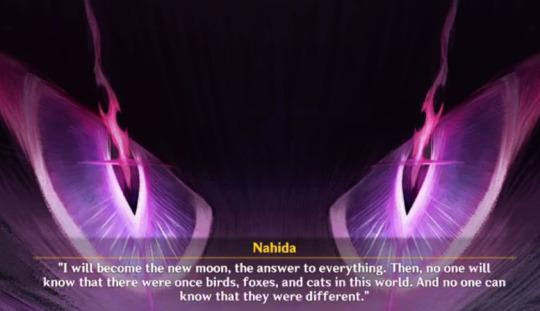
They essentially create an artificial ubermensch capable of redefining values, but the real ubermensch is found behind the artificial god itself.
Crime and punishment
Nietzsche called Fyodor Dostoevsky the only psychologist he had anything to learn from, as he was deeply influenced by the psychology of his novels —of which he read botched translations that didn't quite transmit the author's philosophy, but still.
The novel Crime and Punishment has a protagonist that represents the opposite of the author's beliefs, who happens to be quite similar to Nietzsche's idea of the ubermensch or the higher man. This character justifies his crime (a murder) to himself arguing that people are divided into the ordinary and the extraordinary, and the extraordinary have the right to commit crimes if it allows them to put forward their extraordinary contributions to the world.
From Crime and Punishment:
“Ordinary men have to live in submission and have no right to transgress the law, because, don't you see, they are ordinary. But extraordinary men have a right to commit any crime and transgress the law in any way, just because they are extraordinary.”
“...if the discoveries of Kepler and Newton could not have been made known except by sacrificing the lives of one, a dozen, a hundred, or more men, Newton would have had the right, would indeed have been in duty bound…to eliminate the dozen or the hundred men for the sake of making his discoveries known to the whole of humanity. But it does not follow from that that Newton had a right to murder people left and right to steal every day in the market.”
The protagonist sees himself as an extraordinary man, therefore, his murder is justified in contribution made to the world in exchange.
For Nietzsche, who sees life conditioned on the dominance over the life of others, a criminal is a man whose primordial human impulses to exercise power, which in the ordinary men have been suppressed by the dominating morality, have found an unconventional outlet through crime. Thus, a criminal is a symptom of a sick society that has domesticated itself out of its own nature.
The criminal as a glorified outcast, a rebel against modern society whose abhorrent behavior is a healthy instinct that denotes potential —at least symbolically, he wasn't calling out to people to commit crimes per se.
While Dostoevsky wrote the protagonist of his novel to struggle with guilt in the form of an illness and allowed him to find salvation in facing punishment for his crime, Nietzsche holds the criminal in high regard, seeing guilt as something beneath him.
This archetype is popular in media with characters like Hannibal Lecter, and indeed, many fans of the game expected Alhaitham or Scaramouche to fulfill it, but the character that truly embodies the outcast genius is The Doctor.

Dottore commits crimes against others to carry out his plans, never feeling guilt or shame. He was expelled from the Akademiya precisely for violating the ethical code all scholars are governed by and, as Nietzsche's ubermensch, aims to redefine the values of the world by collaborating with the Tsaritsa to “burn the old world.”
However, Dottore is the antagonist of the chapter, and the attempt at manufacturing the artificial god is depicted as an act of hubris, not a brave crusade against the restraining morality of religion. Furthermore, both the sages and Scaramouche face punishment (in their own way), something Nietzsche would disapprove of in an appropriate higher man.
Looking back on the Akademiya, the scholars seem to suffer under the culture of egoism and competition so well established in the institution.
They're often disoriented in their life, contrasting with the villagers who know themselves and their place in the world.
And the god the sages had dismissed as unworthy is reinstalled as the archon, maintaining the institution as it was while taking down the Akasha, the method of control of the sages.
Nietzsche’s egoism is rejected by the narrative, it raises and it falls in the course of the chapter, but what does this mean for the region?
Part 2 will examine how the narrative engages with the philosophies of altruism and how both egoism and altruism converge in the characters of Alhaitham and Kaveh
#sumeru#long post#genshin lore#posted some weeks ago and meant to cross post here the two parts together but i dont think its gonna be written in quite a while#main post
18 notes
·
View notes